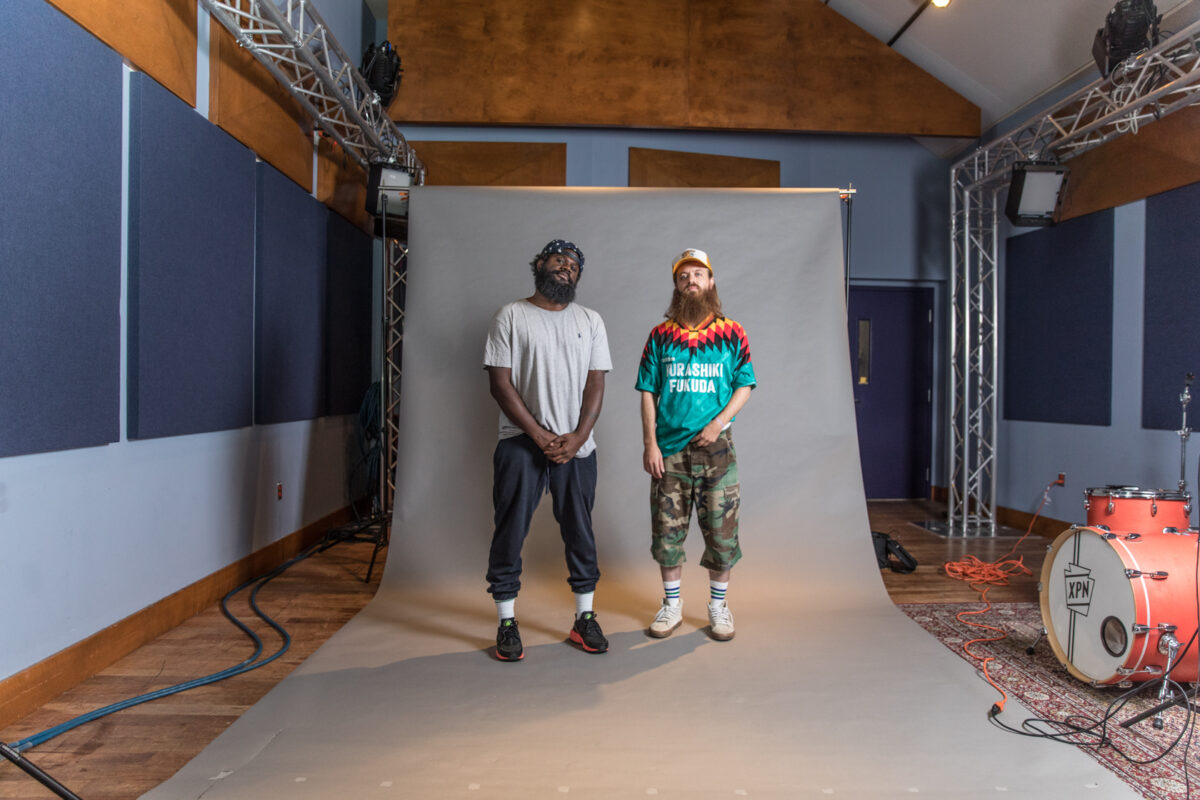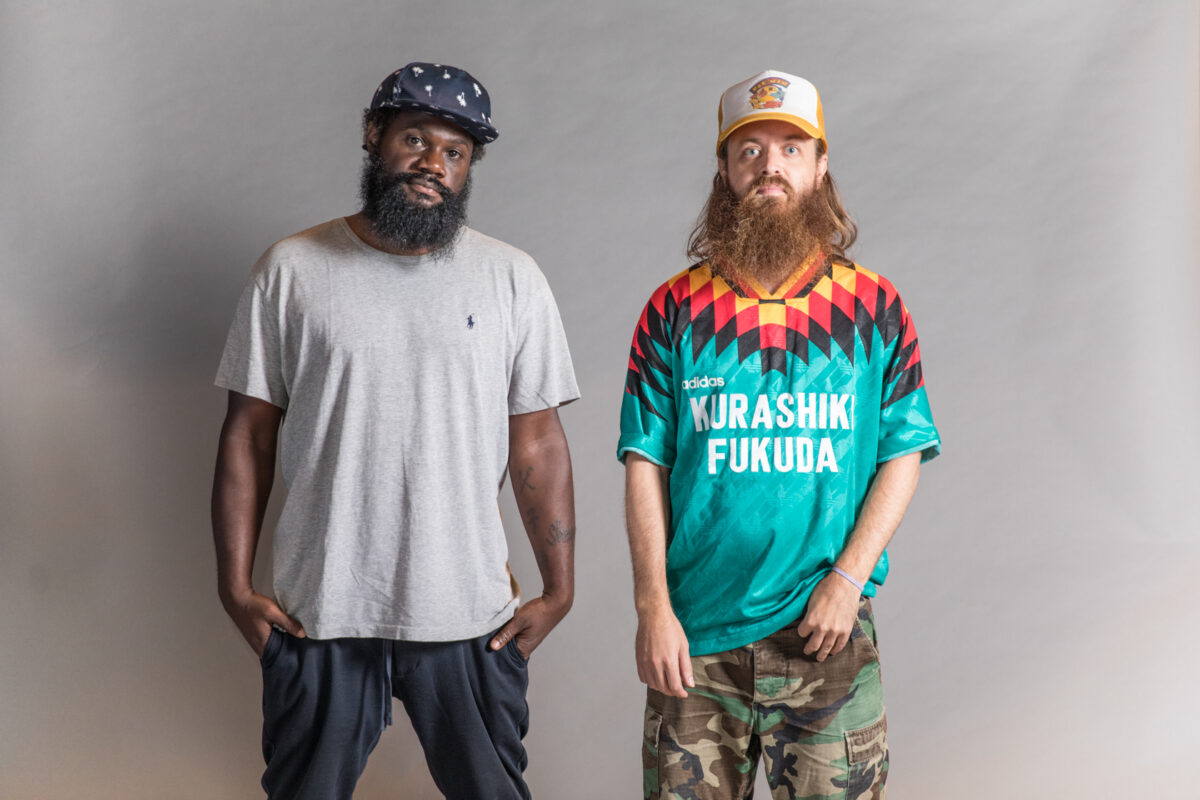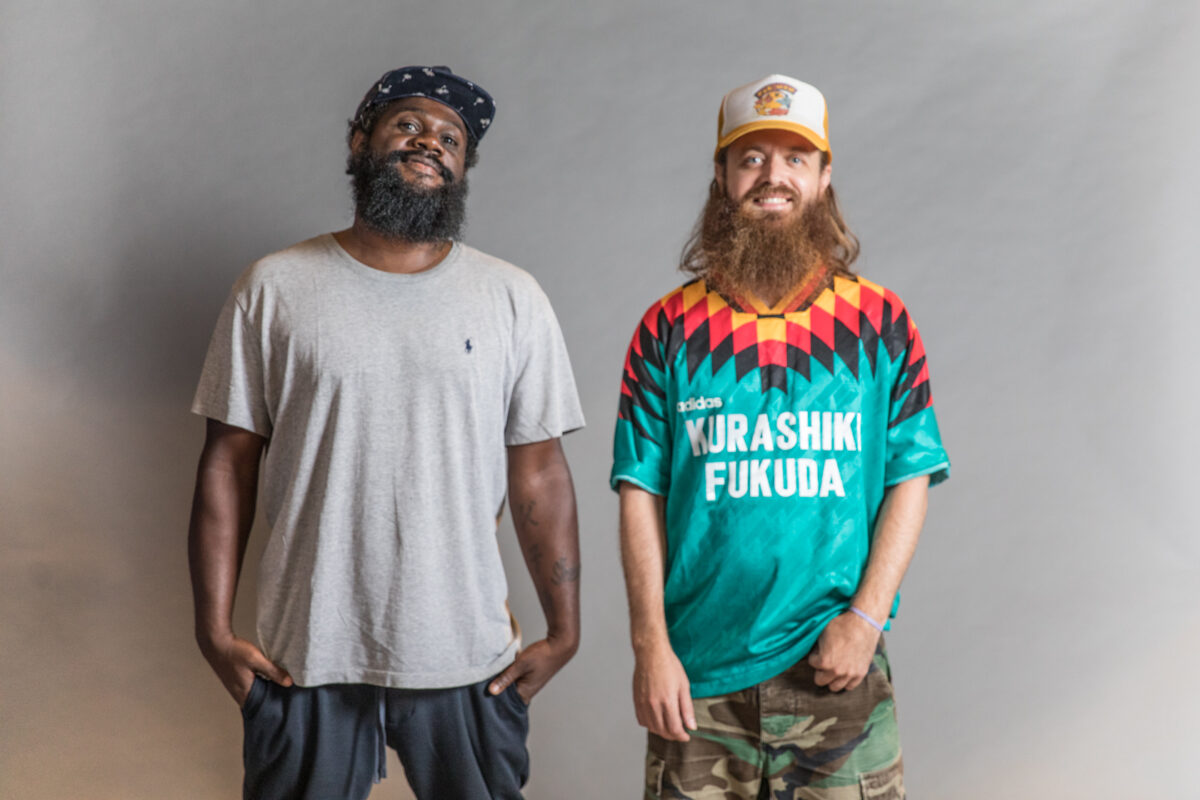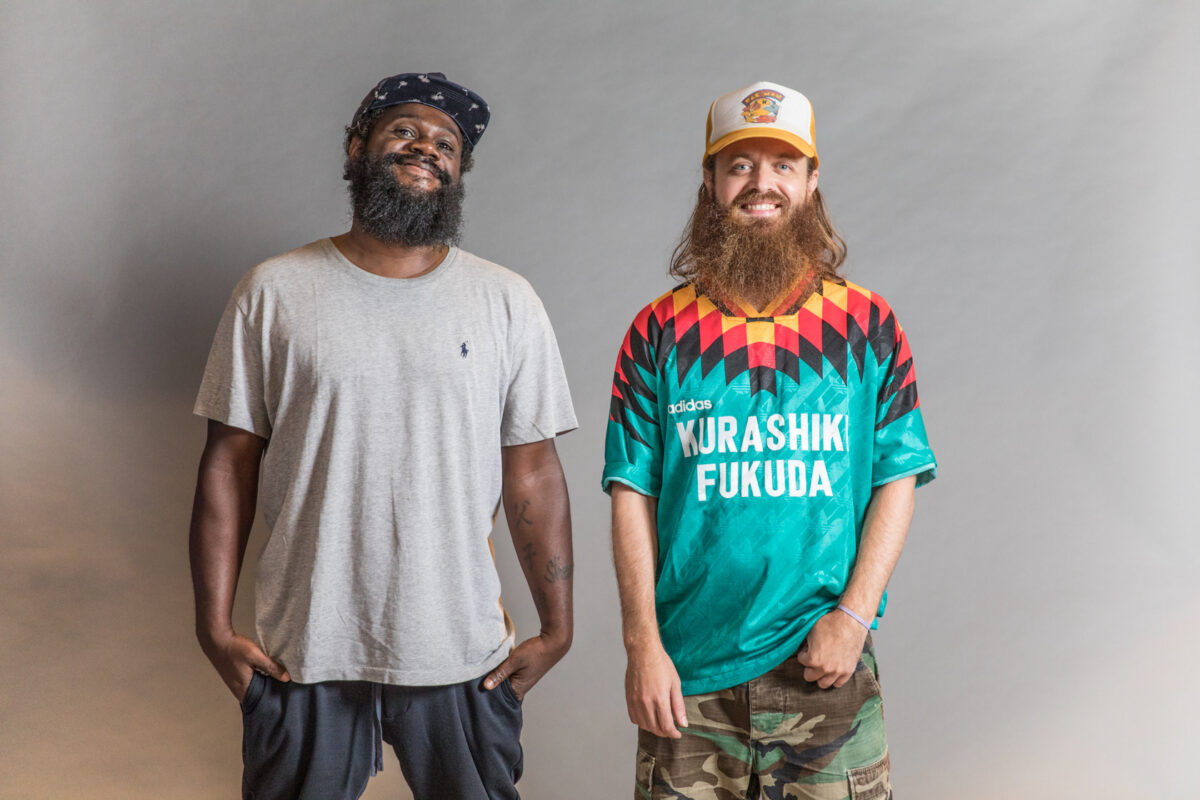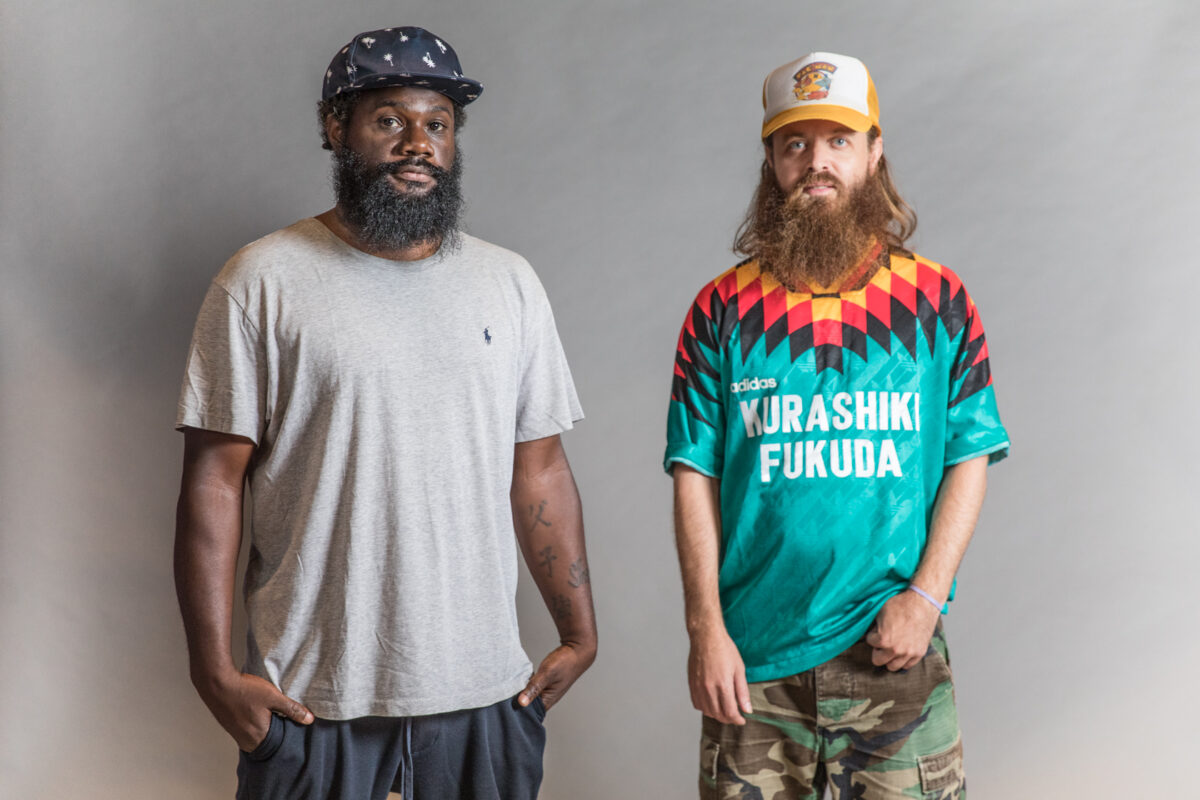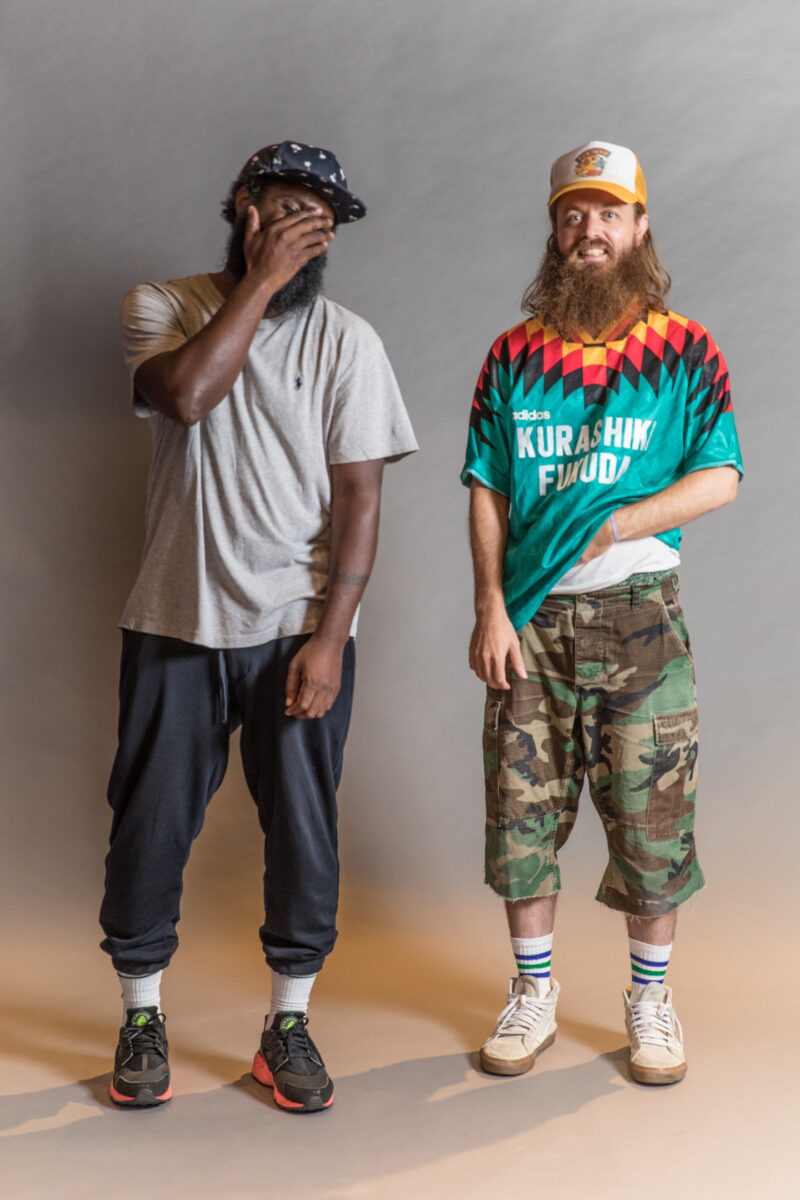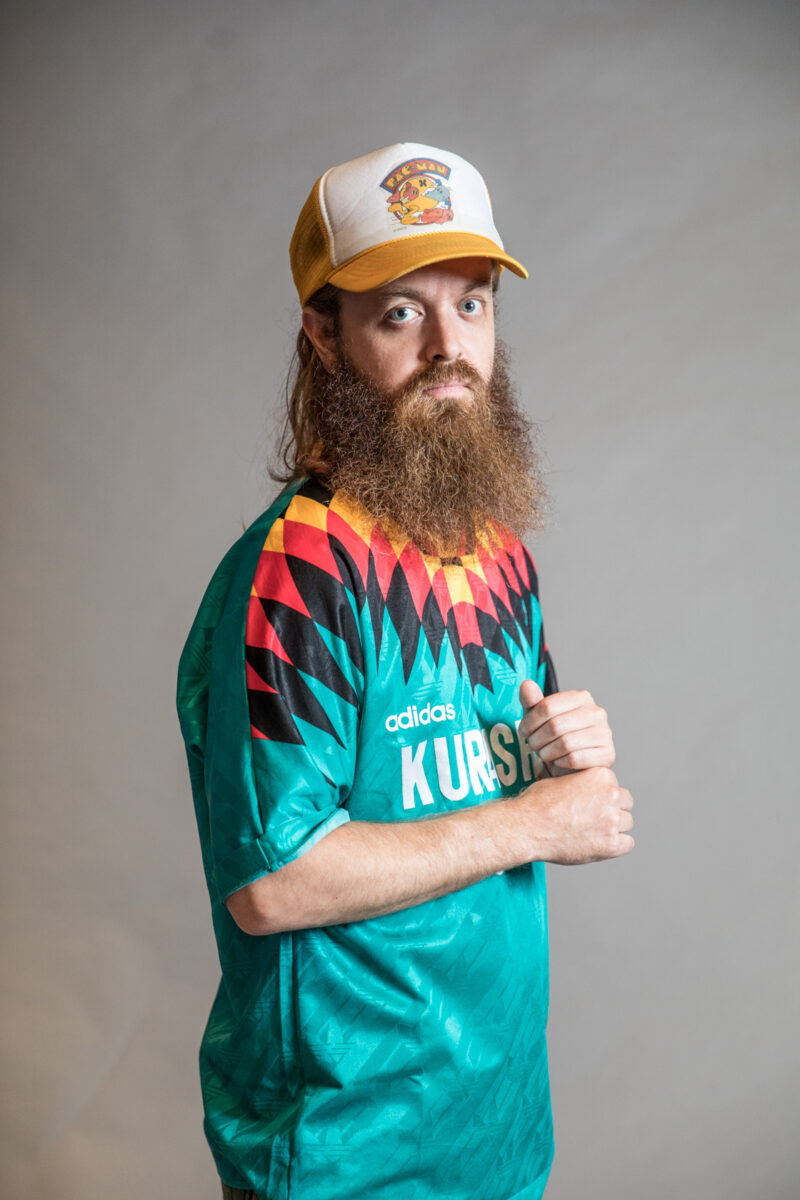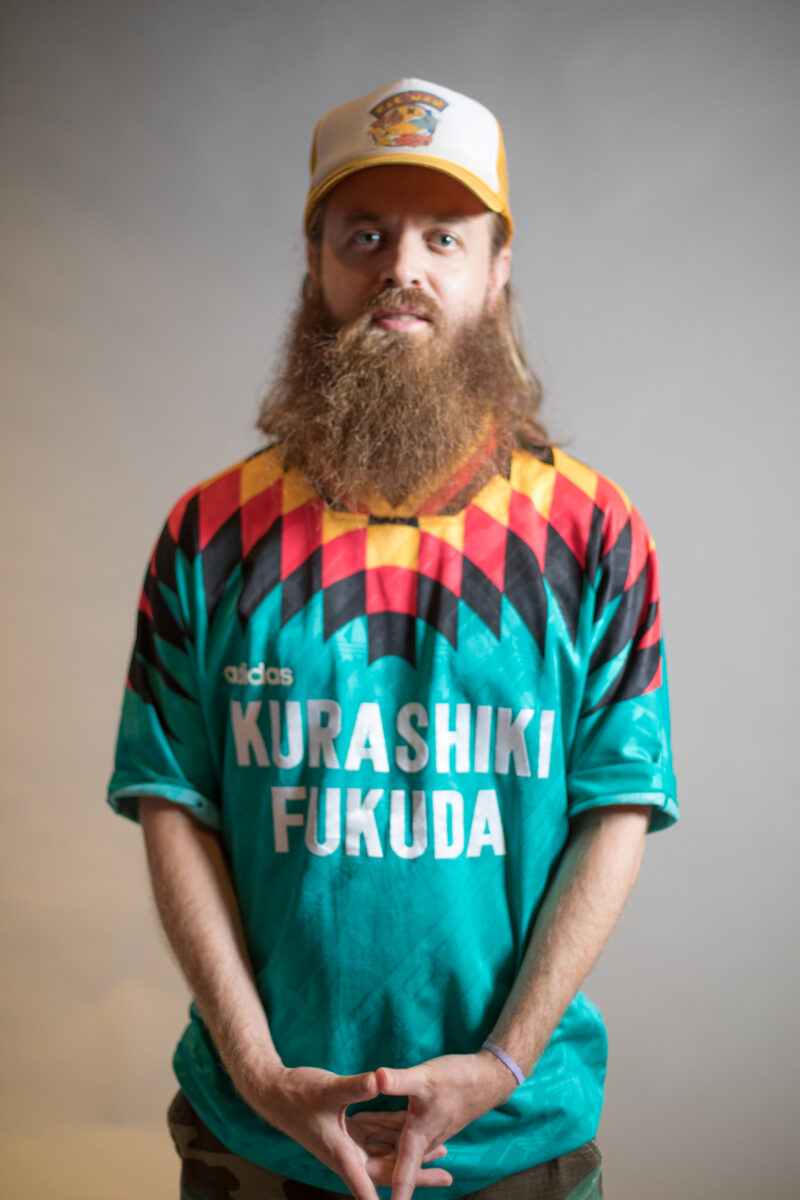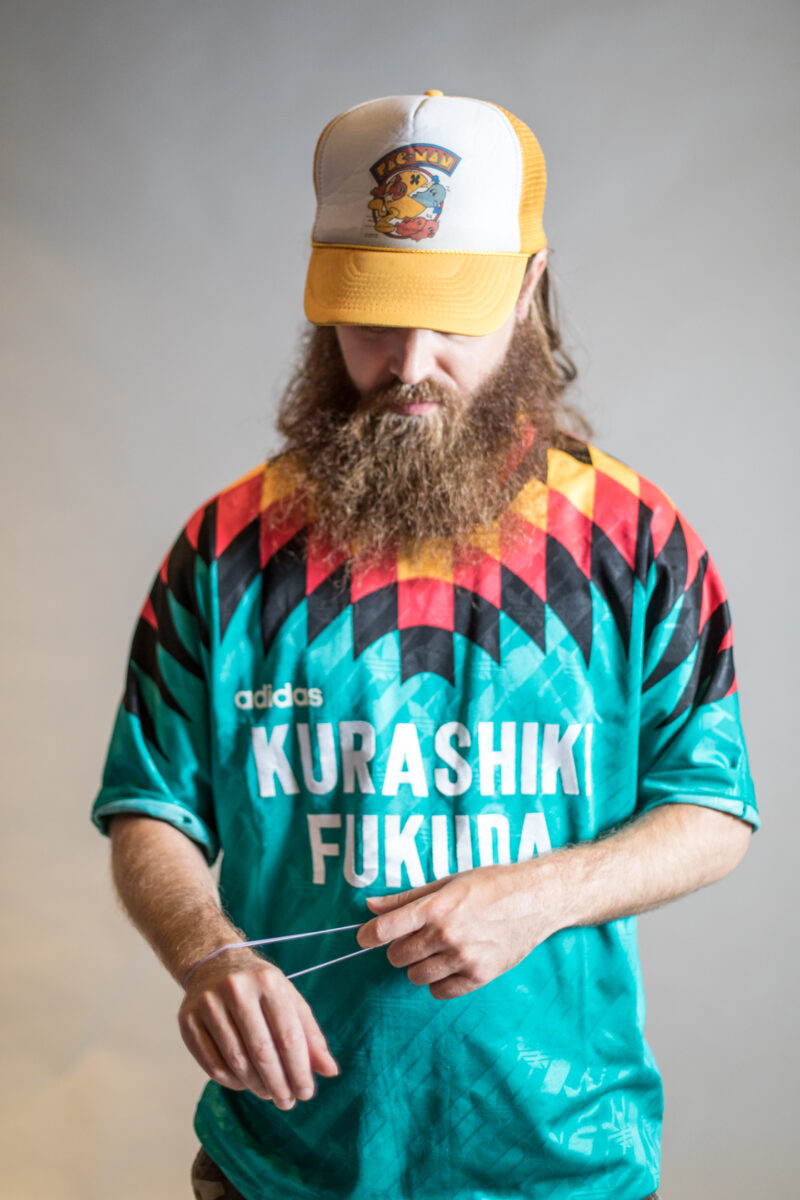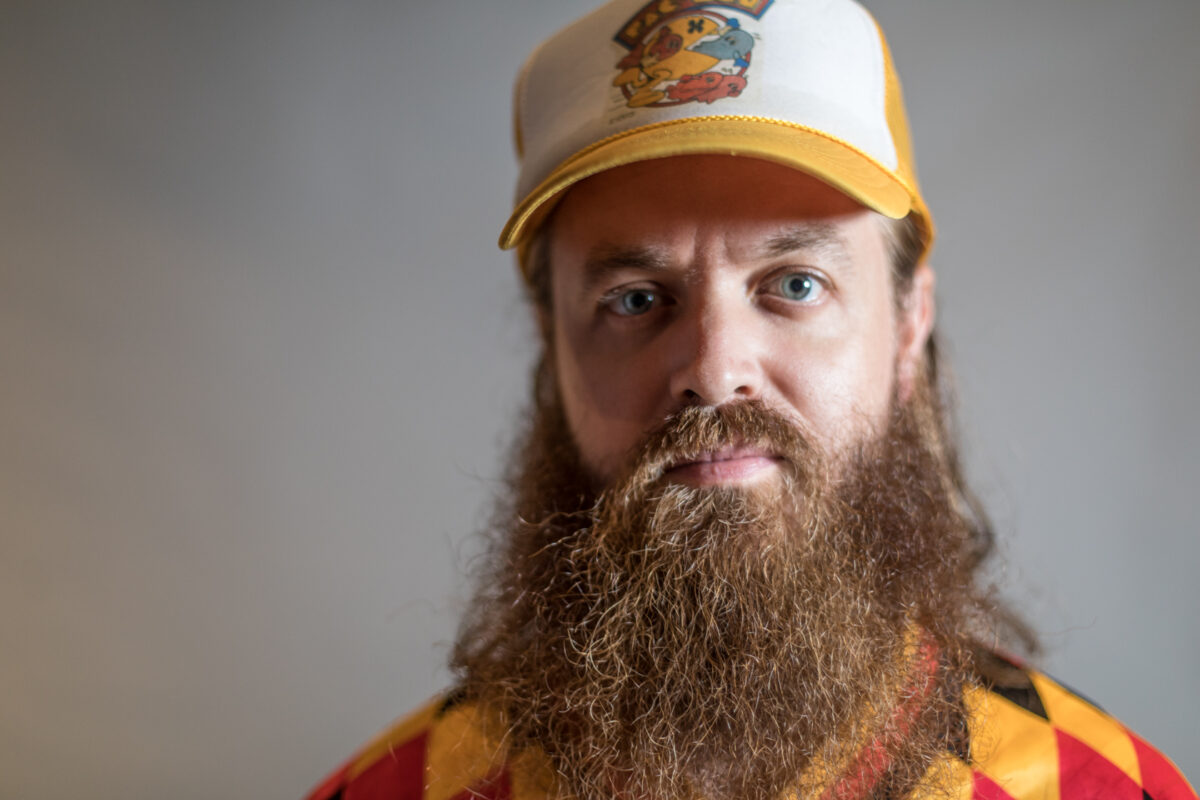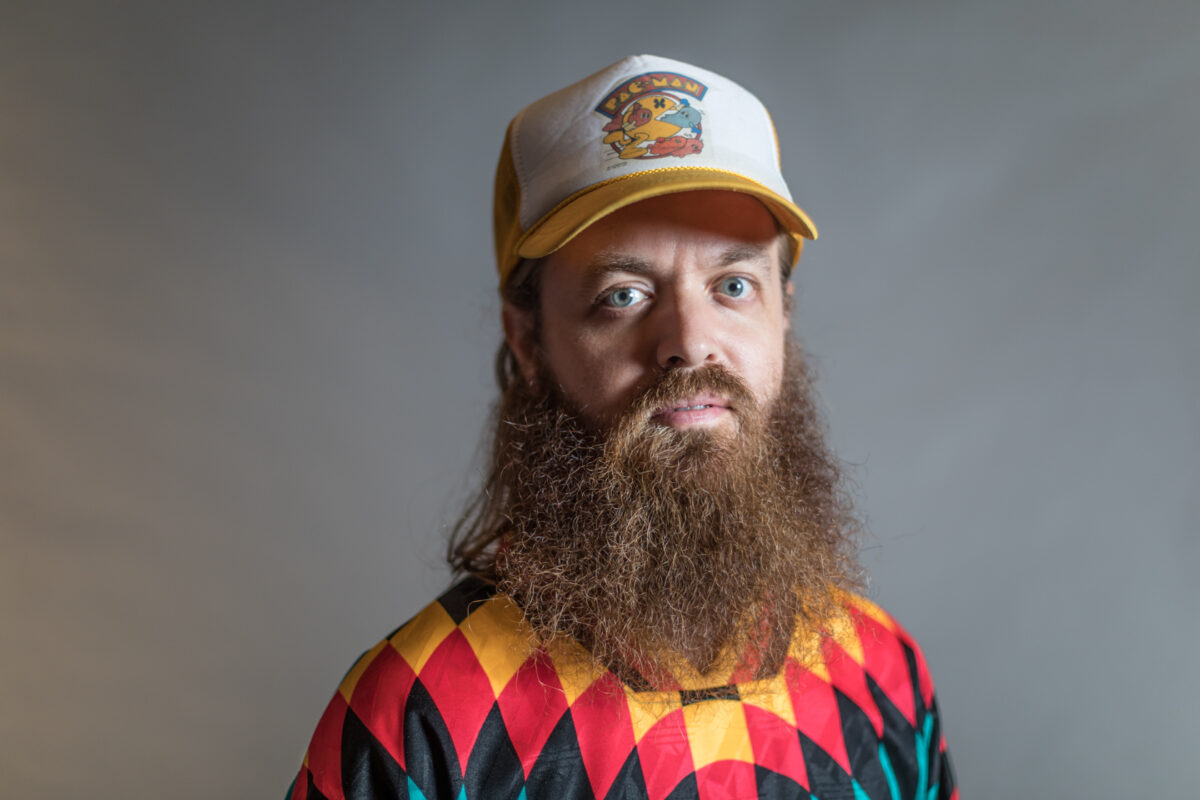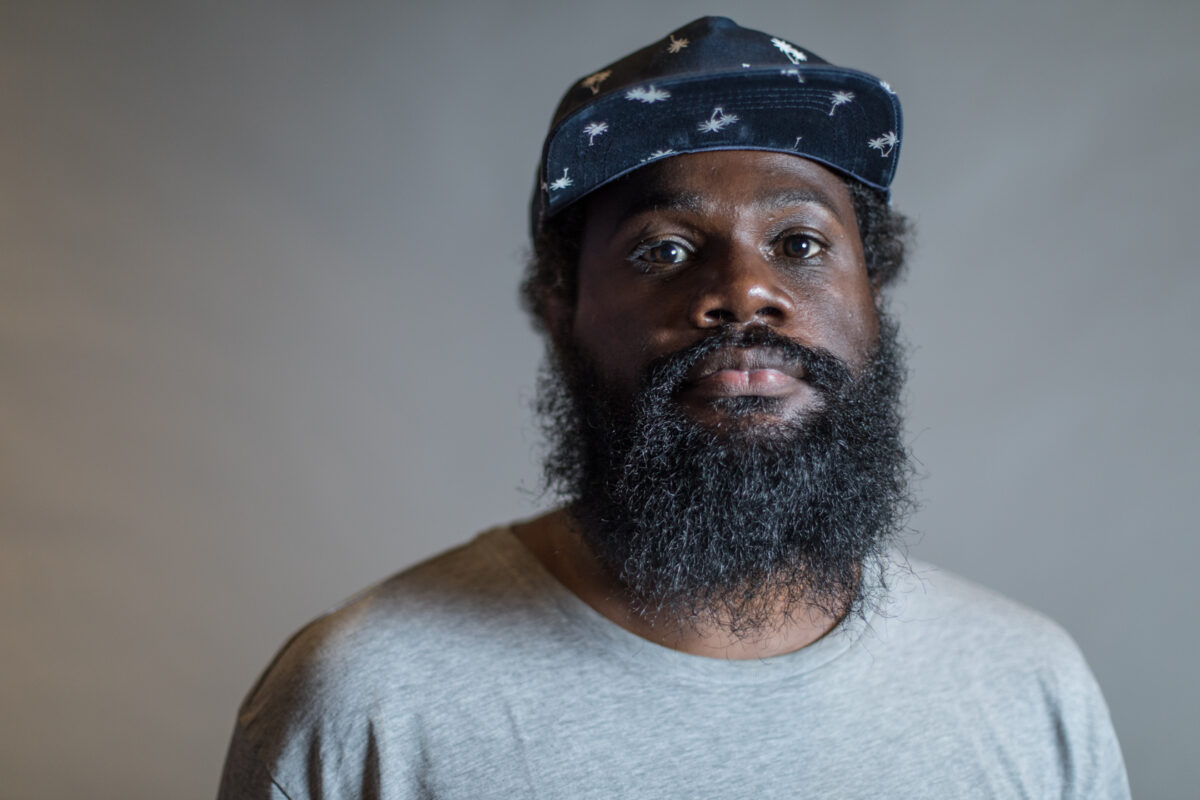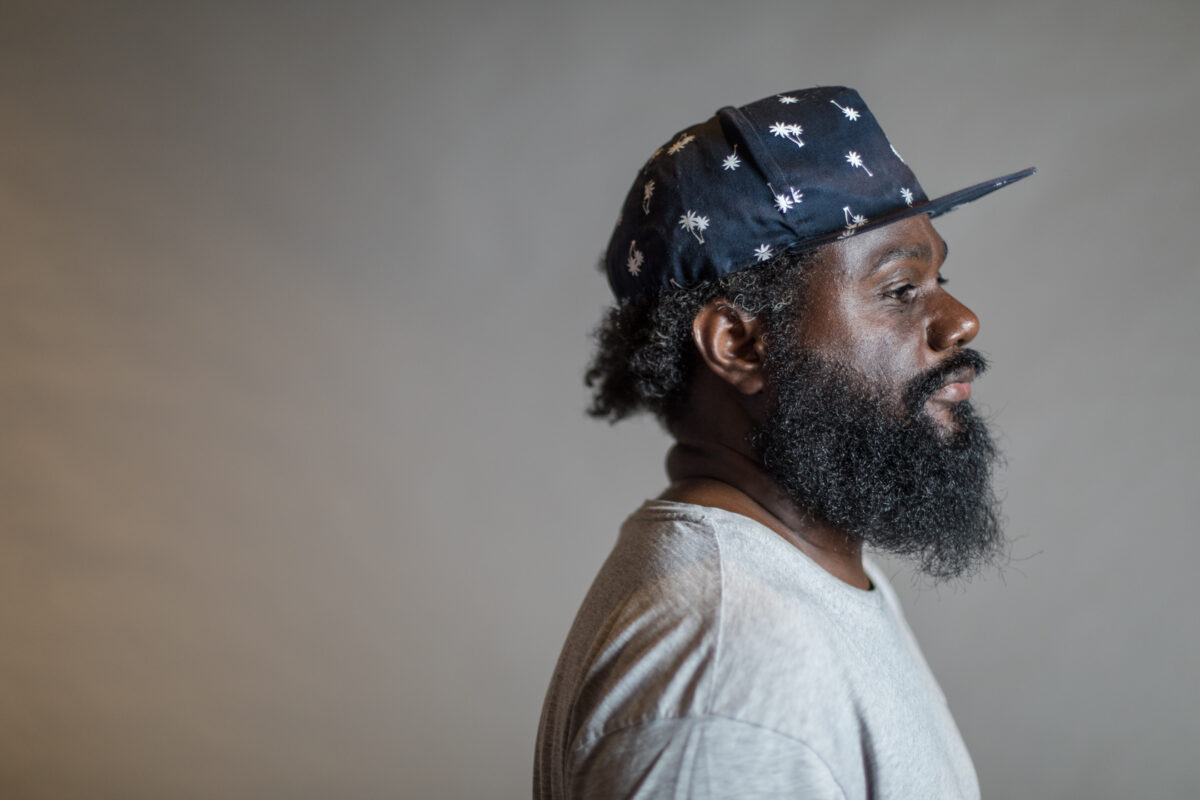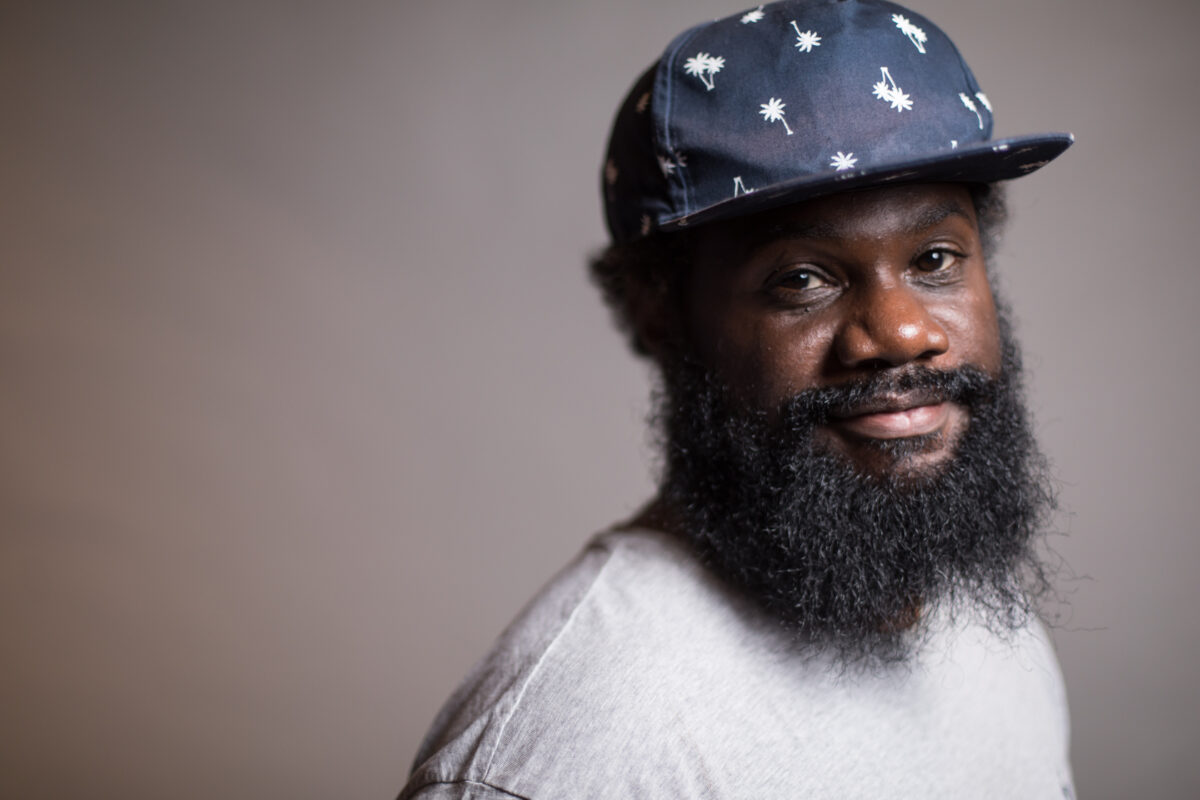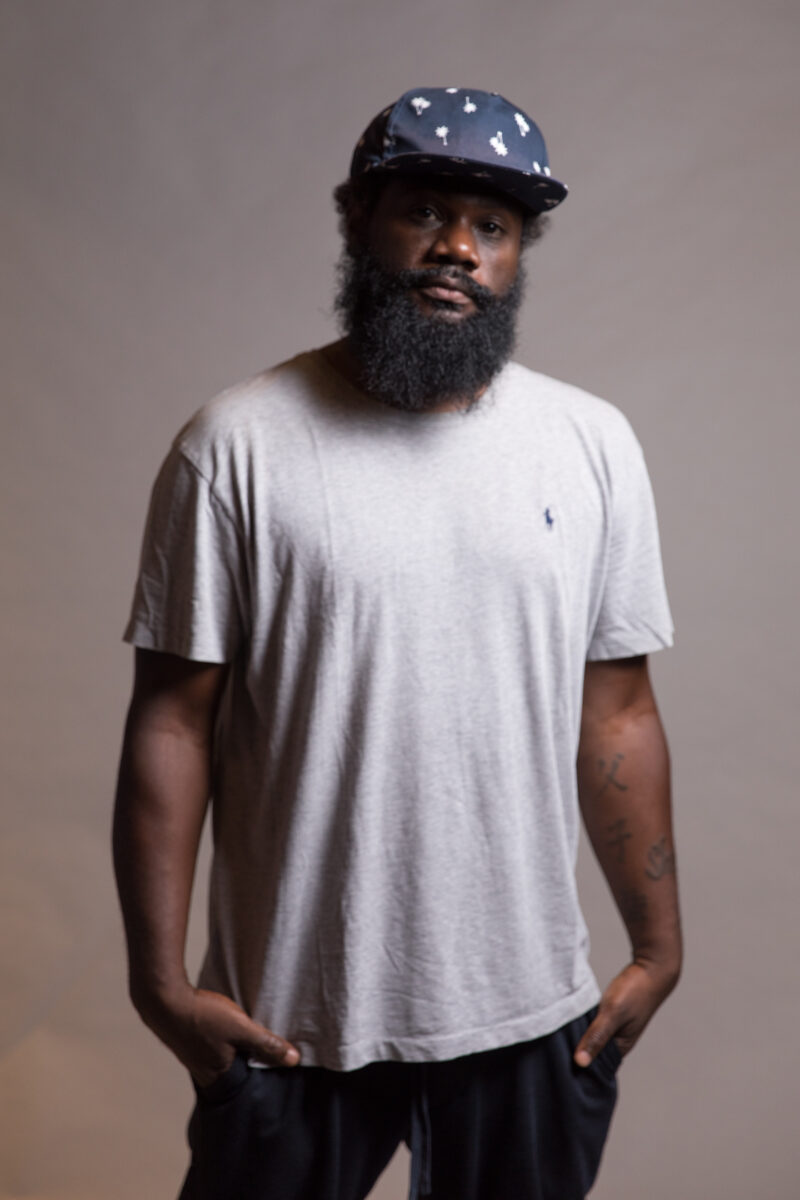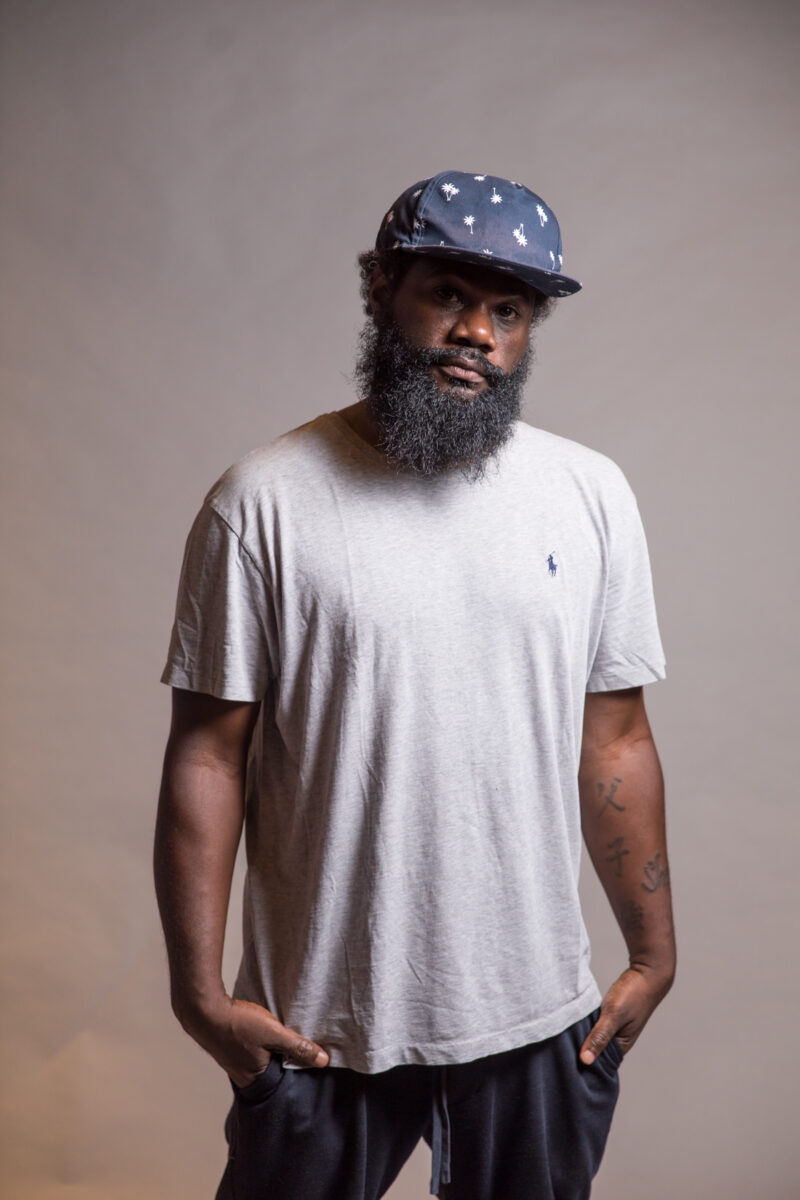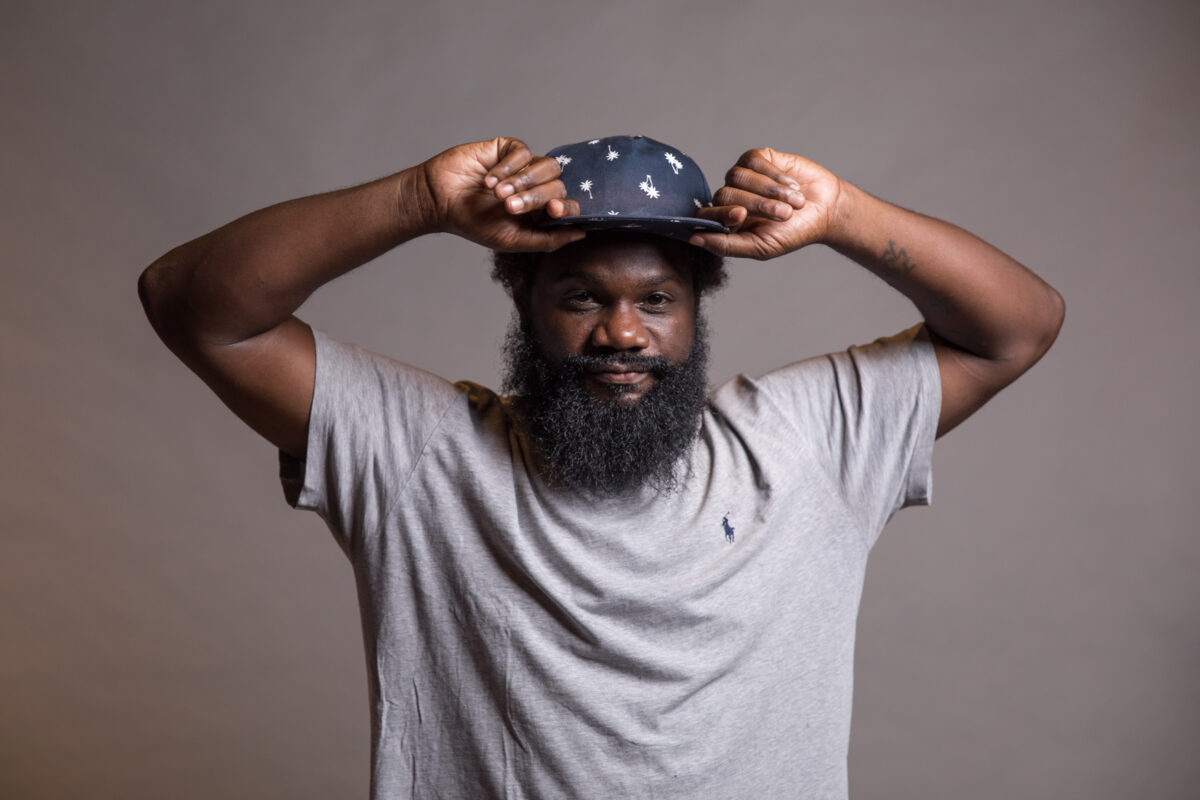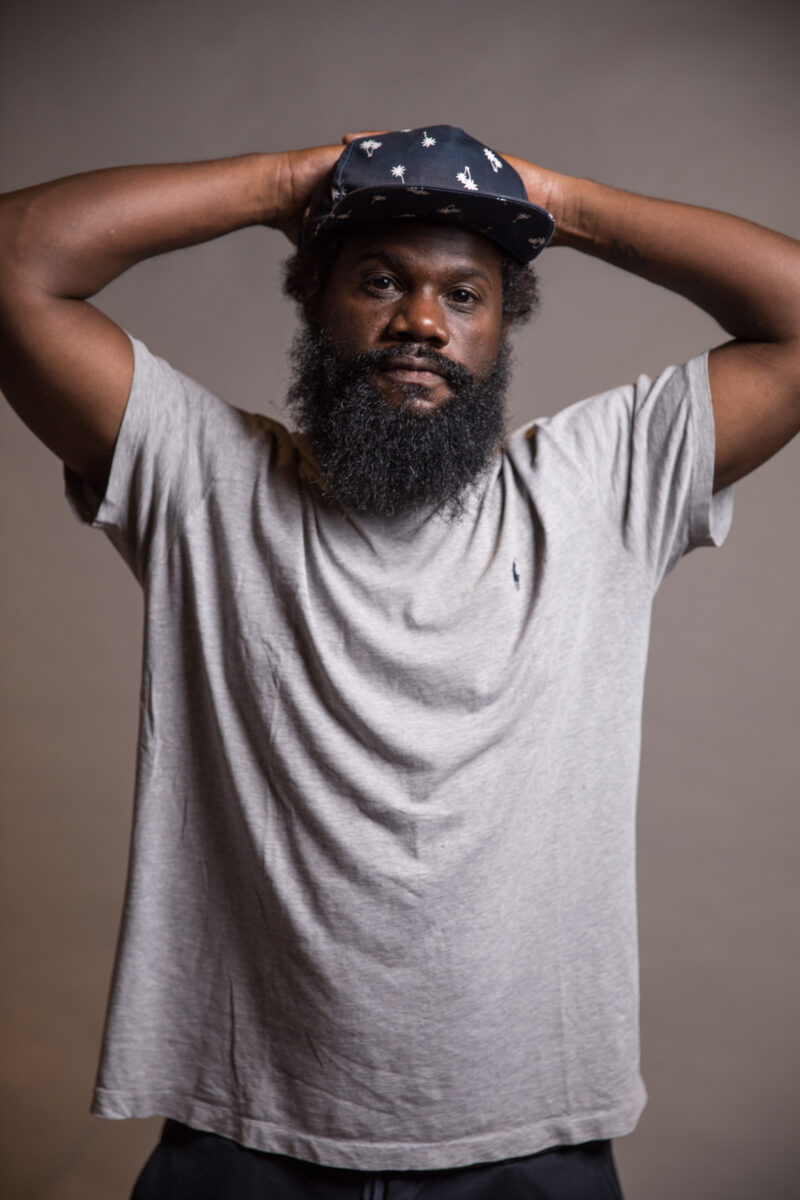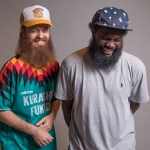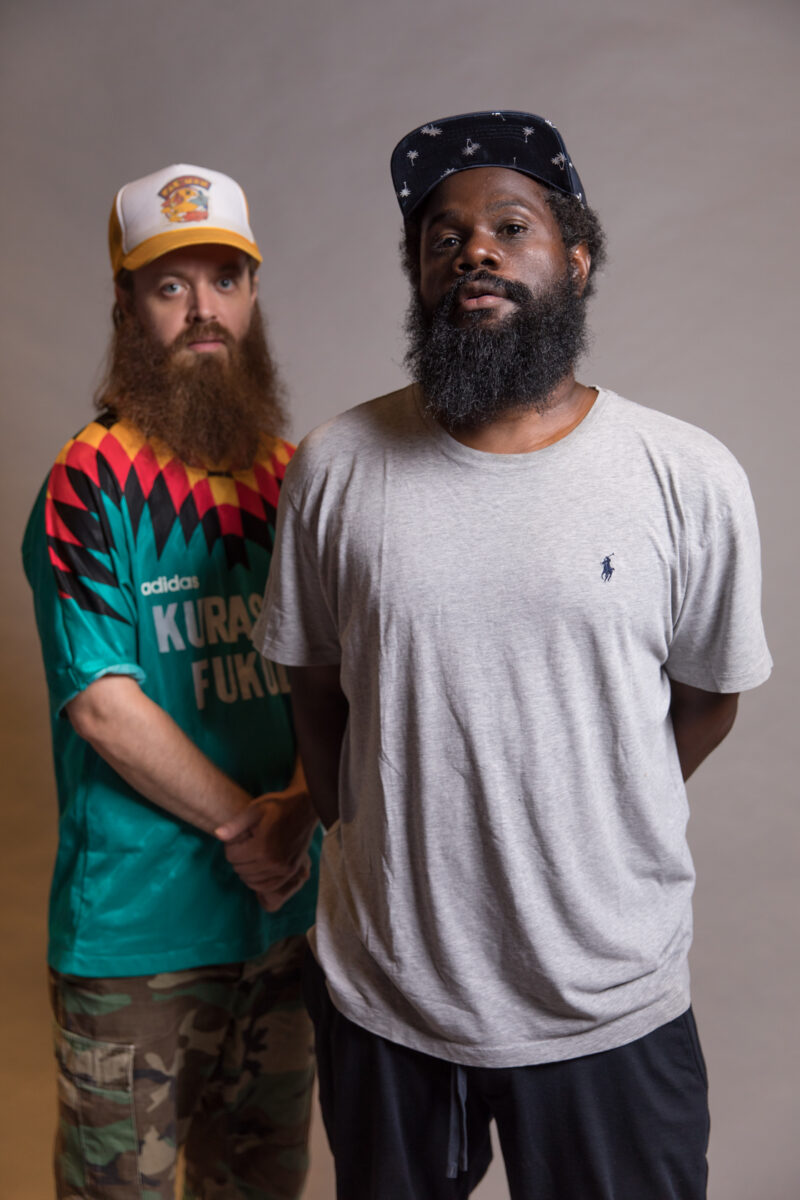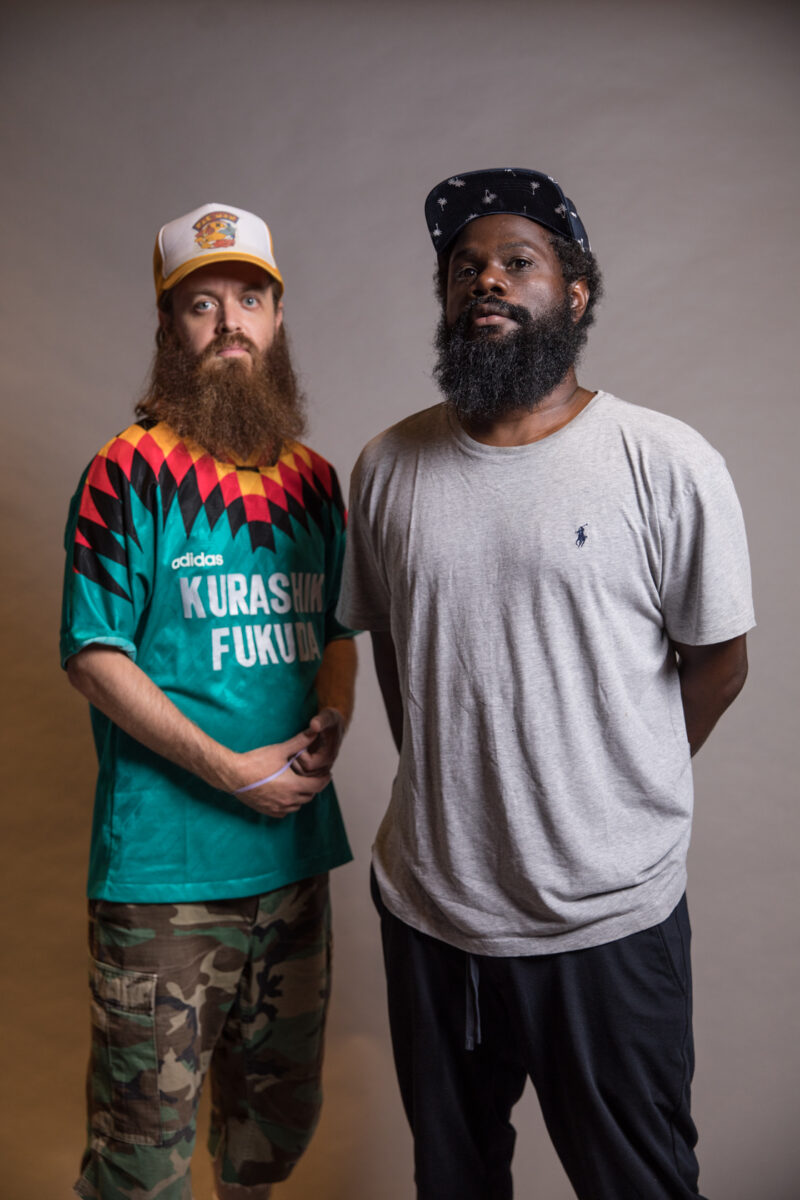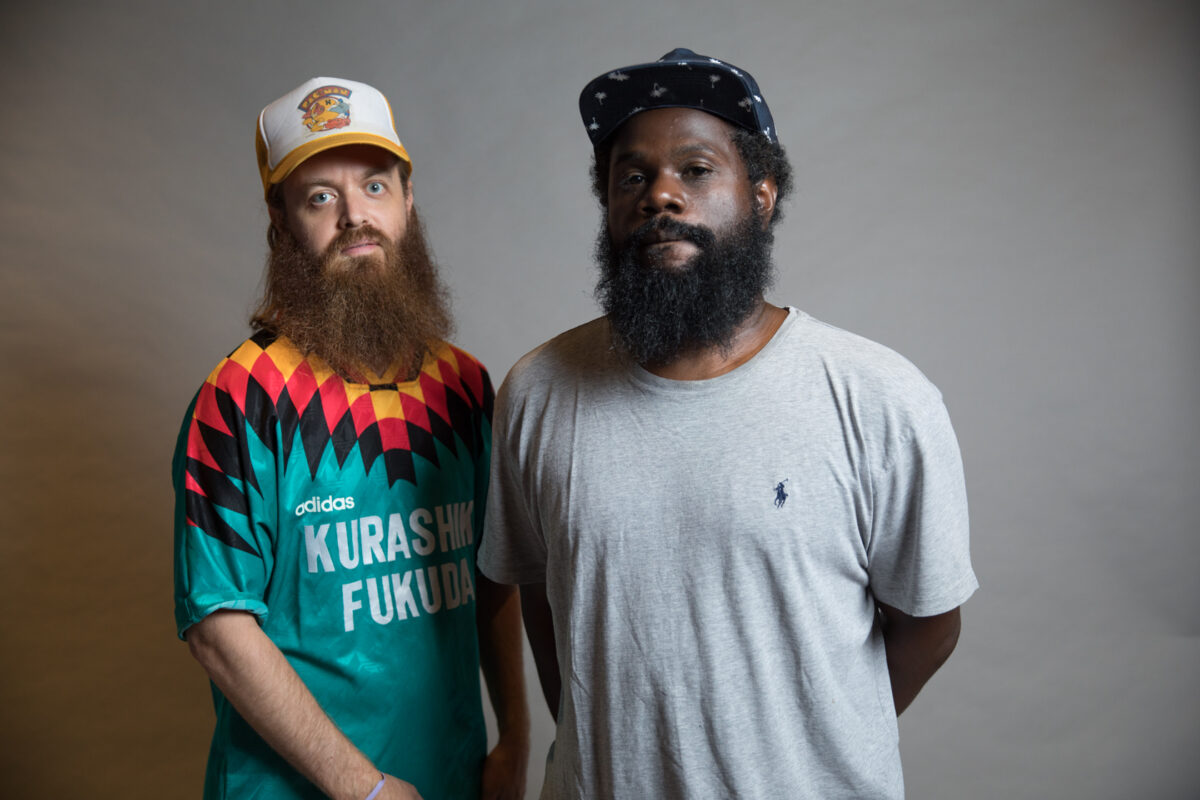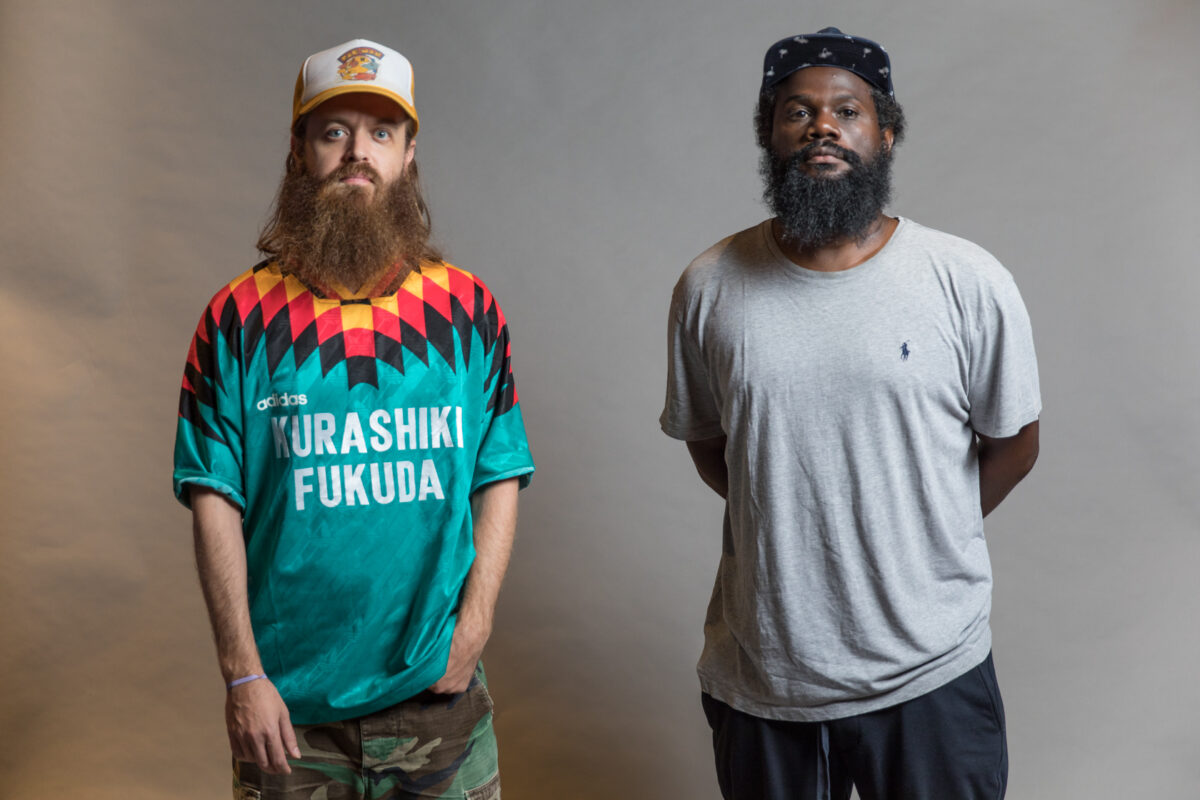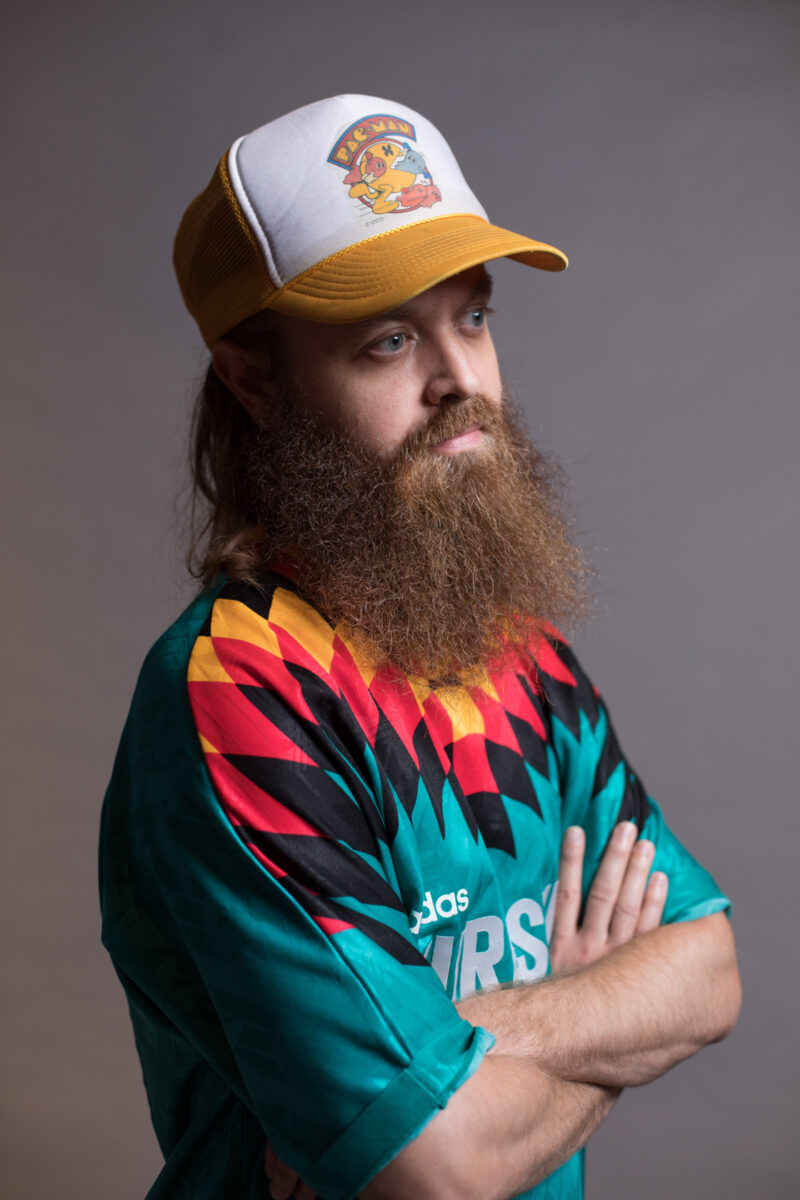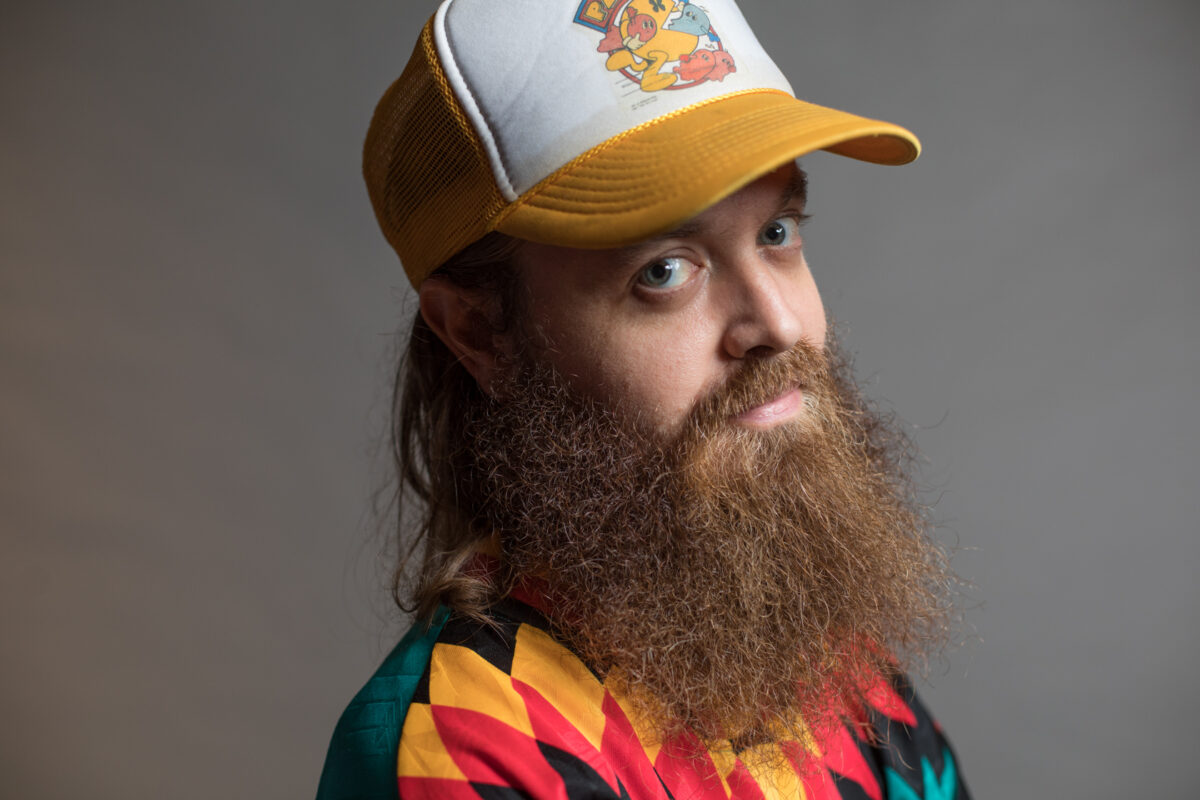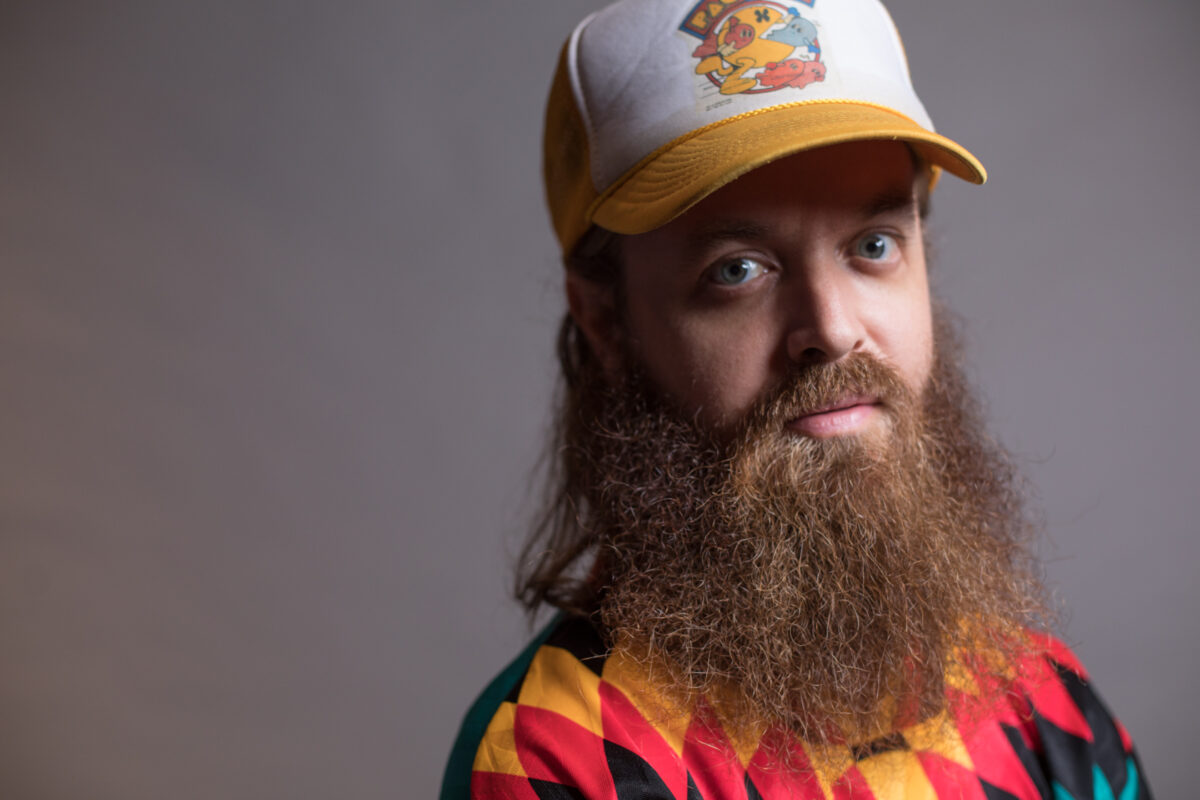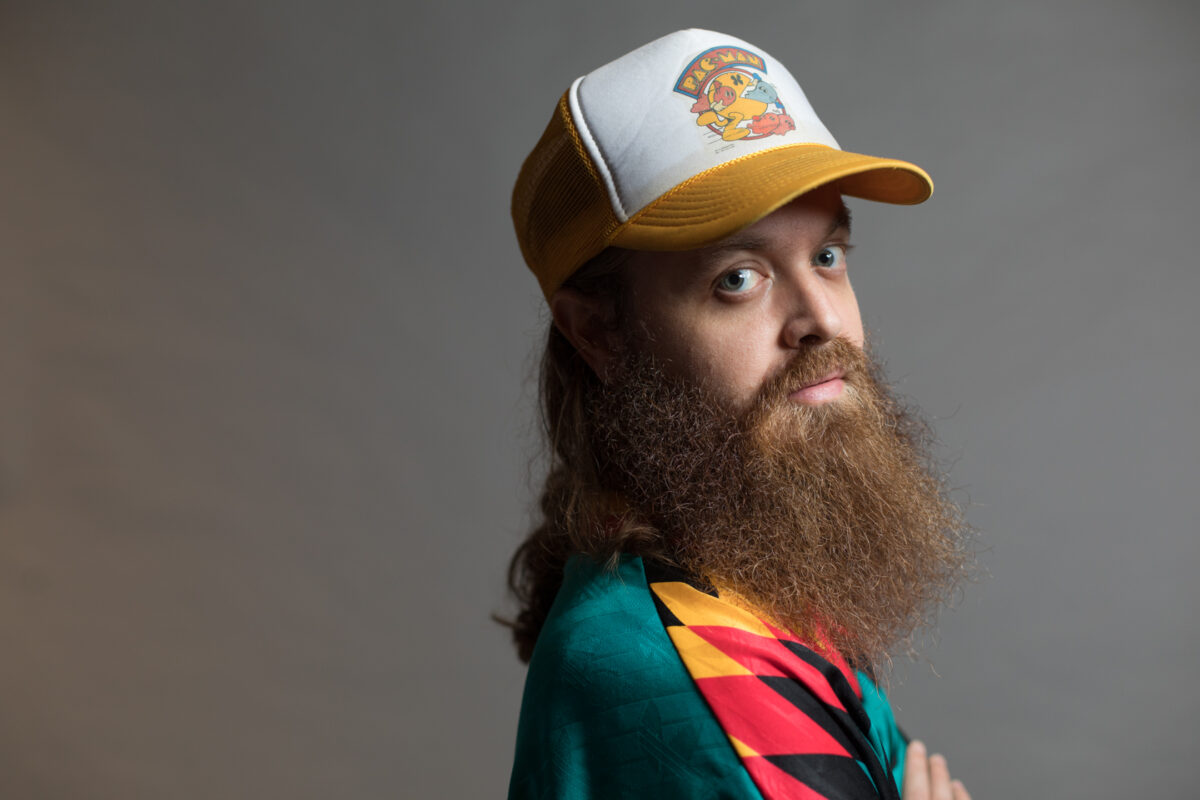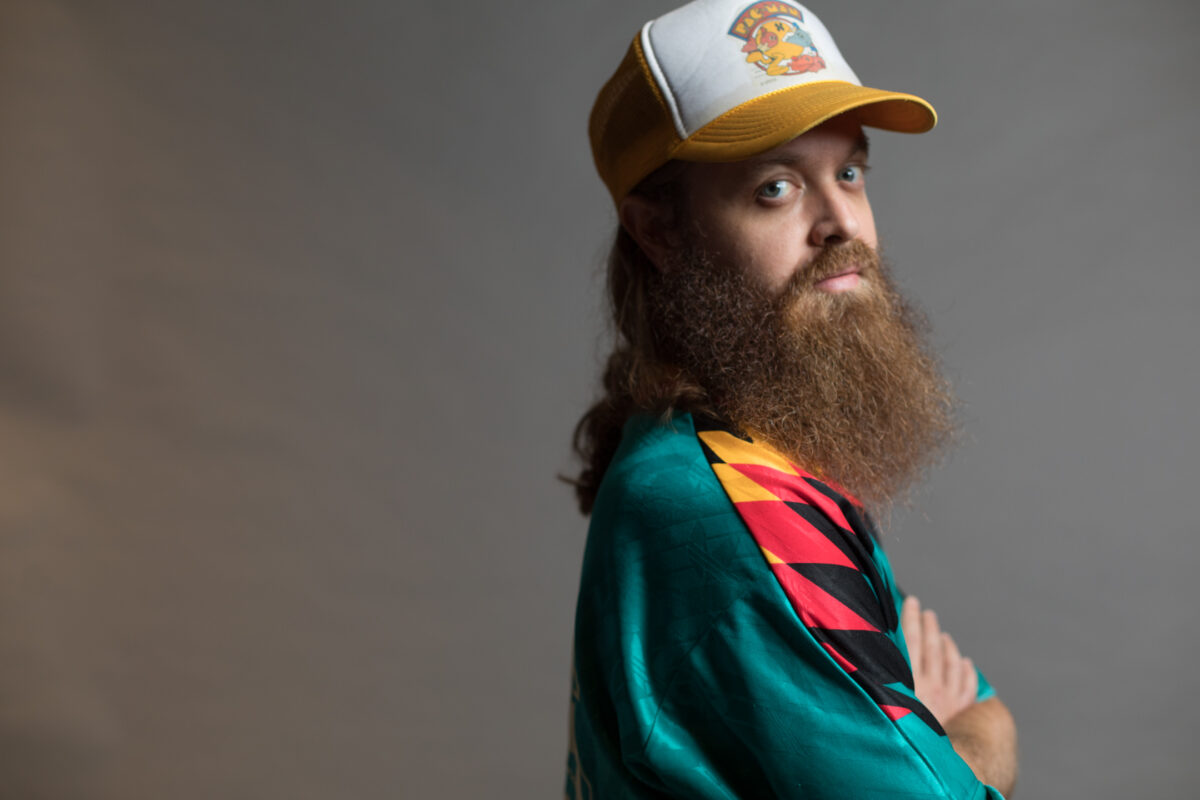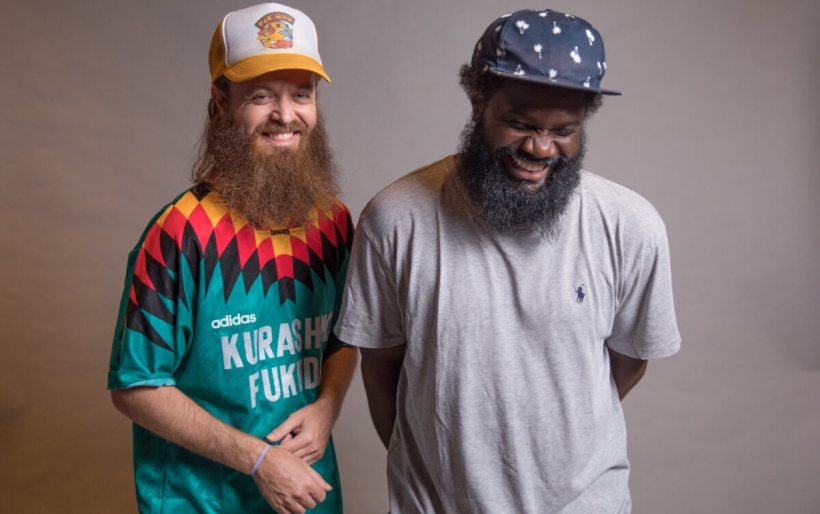
Killiam Shakespeare | photo by Josh Pelta-Heller for WXPN
The High Key Portrait Series: Killiam Shakespeare
“High Key” is a series of profiles conceived with the intent to tell the story of Philly’s diverse musical legacy by spotlighting individual artists in portrait photography, as well as with an interview focusing on the artist’s experience living, creating, and performing in this city. “High Key” will be featured in recurring installments, as the series seeks to spotlight artists both individually and within the context of his or her respective group or artistic collective.
Steve McKie and Corey Bernhard have conspired for the past five years on Philly-based collective Killiam Shakespeare. The two manage to leverage life-long musical roots, their own creative chemistry, a deep star-studded creative network and classical instrument training to great effect, marrying diverse influences to build beats and establish unique musical moods.
McKie and Bernhard are gearing up for a big back-half to 2019, including west coast collaborations, new music, and an appearance later this fall at the World Café’s World Jam. They’re kicking it off though at the XPoNential Music Festival this weekend, with an opening night appearance at BB&T Pavilion this Friday.
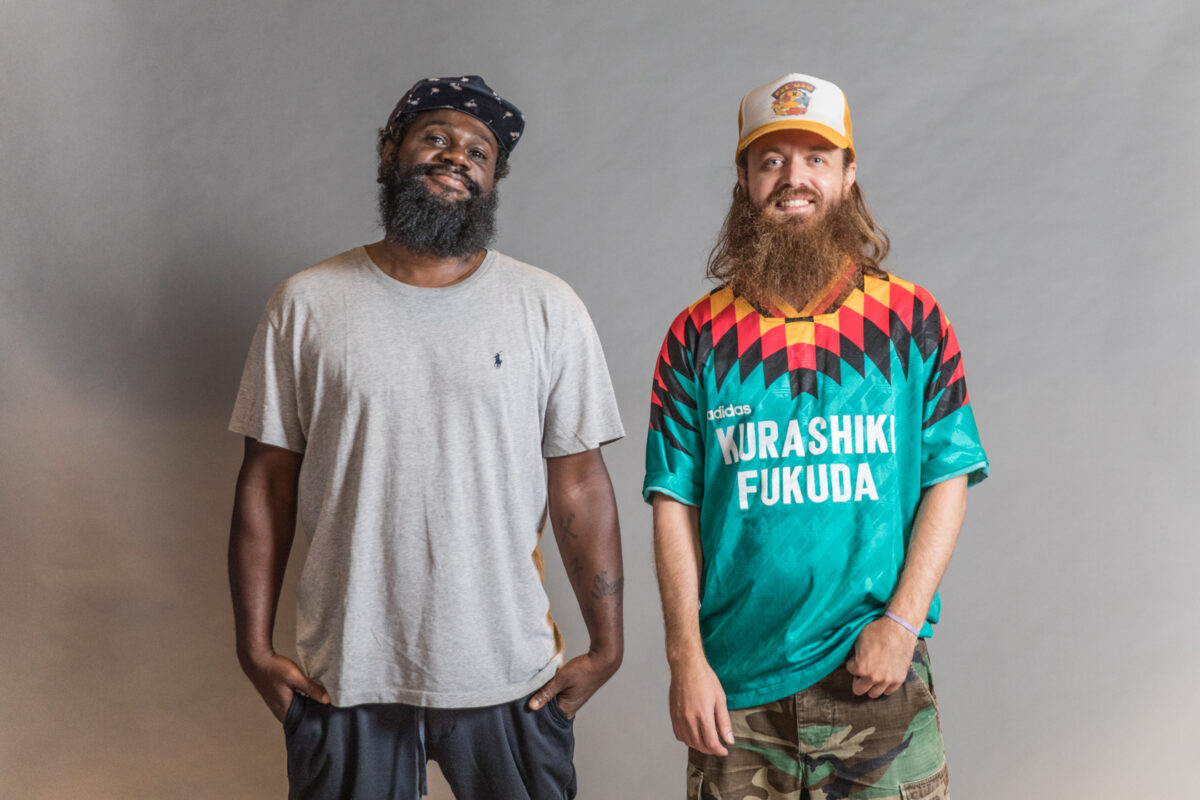
Killiam Shakespeare | photo by Josh Pelta-Heller for WXPN
The Key: Are you guys from Philly originally?
Steve McKie: I’m originally from Philadelphia. I grew up in North Philly, and we moved to West Philly when I was about ten years old.
Corey Bernhard: I’m from Massachusetts. Born in Boston and then I grew up in a town called Shrewsbury. And then I lived in Boston for a few more years and eventually made my way down here.
TK: What age were you when you got down here, and why did you come?
CB: Well, I had been living in New York. I was in Brooklyn for like six years, you know, traveling and touring and playing gigs and stuff. So me and Steve met playing in Bilal’s band. You know, he’s a legendary Philly vocalist, and we started tracking out together, working on a whole bunch of music, and then eventually I ended up moving down here in 2014.
TK: And Steve, you went to High School…
SM: …at University City. That’s not too far from here! They tore it down recently.
TK: What do you remember from high school?
SM: [laughs] I remember I played basketball a lot! I thought I was going to play basketball, you know, and I got injured hurt my shoulder. And music was the next big thing for me, and they had a really cool music program where it allowed us to do gigs all around the city. We got paid for it, and it kind of ushered me right on into playing professionally right out of high school.
So I didn’t attend college or anything. I just, you know, right away just started playing on a professional level.
TK: So rock stardom was your fallback from NBA stardom.
SM: [laughs] You can say so! I mean it wasn’t pretty, it wasn’t designed, I didn’t really see it happening like that. But I worked super hard while I was in school to get my chops up and understand different genres of music. So it got me to where I am now, which is cool.
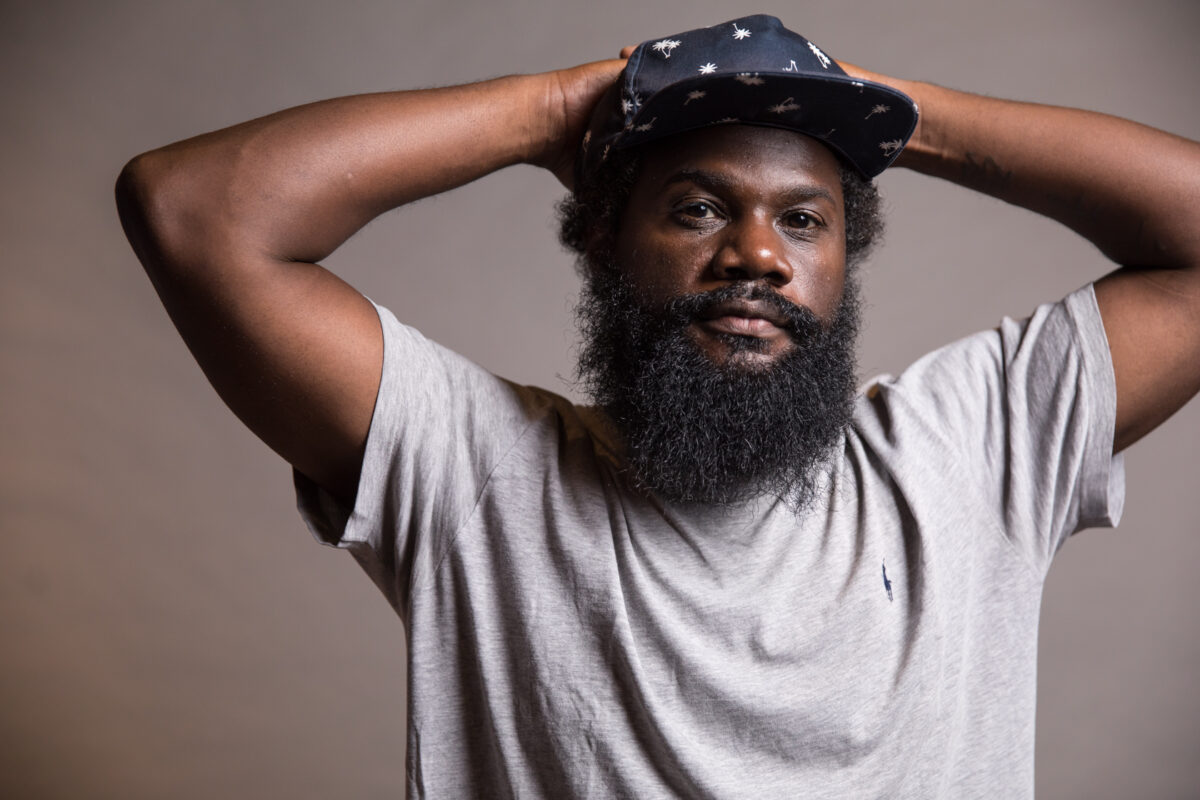
Killiam Shakespeare | photo by Josh Pelta-Heller for WXPN
TK: You guys met in 2014 you said, roughly?
CB: Well we met in probably like 2010. I was still living in New York.
TK: And Killiam formed in 2014?
CB: Probably, yeah.
TK: Did you guys do any projects together before Killiam, besides Bilal’s band?
SM: We did tons of stuff, we did tons of studio work where we played with other different artists from New York and Philly. I think the bulk of how we became Killiam Shakespeare was pretty much us getting in the studio and recording and not really having any purpose for what we were recording. We kind of clicked, and we had a really good bond as far as the music goes, and it went from recording this, recording that…actually we were recording some Bilal records. And from there, we realized that this was a sound that we should pay more attention to and do something on our own.
TK: So in terms of like stuff you guys were creating together, I meant like original material together. Killiam was the first project that you guys really took as a standout project.
CB: I mean we were tracking and producing for other vocalists and stuff, but, as far as putting our stuff out there, putting it out there as with us as the artist or whatever you want to call it, that’s it.
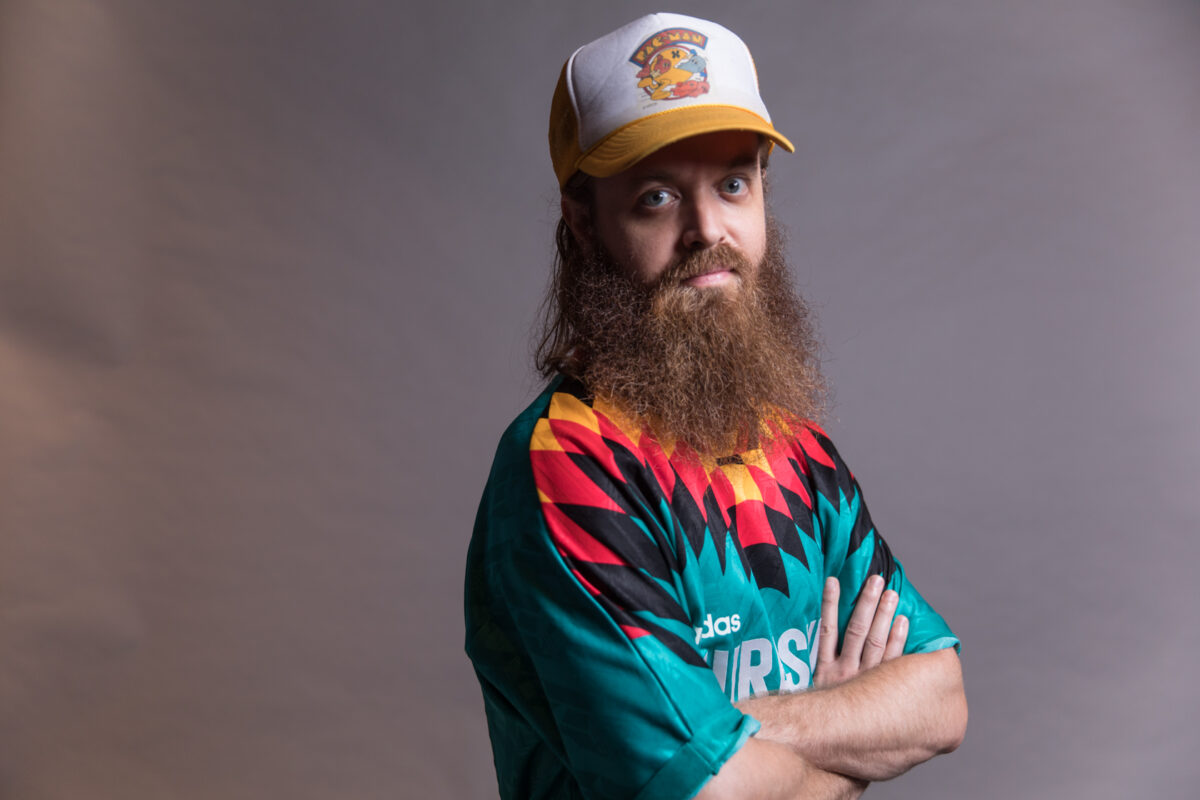
Killiam Shakespeare | photo by Josh Pelta-Heller for WXPN
TK: Where was your first show as Killiam? And what do you guys remember from that night?
SM: Hmm, I gotta go back.
CB: I don’t even remember.
SM: That’s a good question. I think one of the most memorable ones for me was we played the Center City Jazz Fest. We were super excited to play on the festival and play I get to play our music out. And I think we had more time than we realized. [laughs] And we got to we got to playing, and we played our set that we thought was you know, sufficient enough, and then we stopped. And the promoter came in was like “you guys have 20 more minutes!,” and we were like, “whoa!” We were getting everything together and having like a time set and everything wasn’t like in the back of our minds. We were just excited to play a set and, you know, we kind of ran out of like material.
TK: What did you do to fill that time?
SM: He gave us a pass. He let us go.
TK: But that that first show was probably, I guess, a bigger audience than a lot of artists get for the first audience, right?
SM: Absolutely.
TK: So how did that how did that impact your show? How do you feel being on stage? Were you nervous?
CB: We weren’t really nervous. It was great to have an enthusiastic audience. Which festivals are kind of already. You know, people are there because they want to hear some cool music. But it’s not like every early show we did was like that. We definitely played like Connie’s Ric Rac, and there was more people on stage than in the audience. Which was still fun! It was still a party.
SM: We were just excited to play the music and hear the reaction from the crowd, where they never heard a unit play different kinds of music like that together convincingly. So that was the fun part about it. Seeing the reaction on people’s faces.
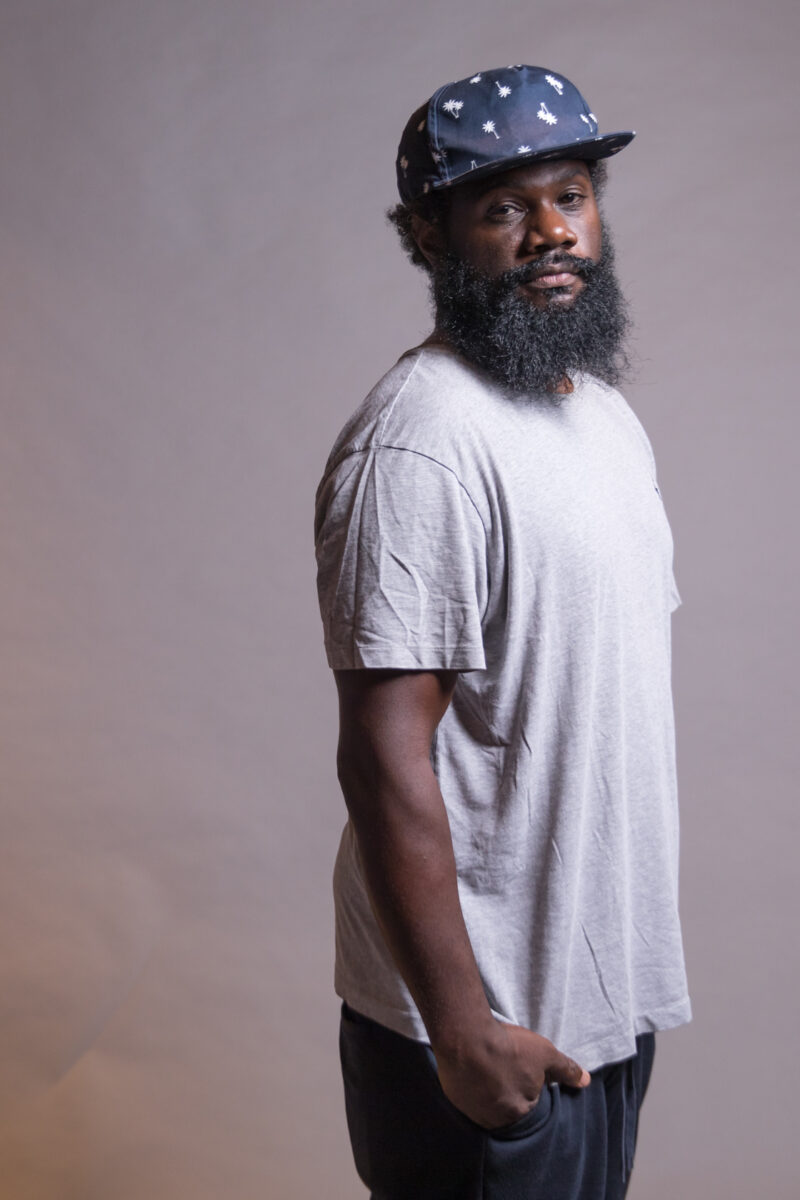
Killiam Shakespeare | photo by Josh Pelta-Heller for WXPN
TK: Steve, how did you first get involved in the Philly music scene?
SM: Wow, that goes back to when I graduated from high school. I would just hang out at studios and Ahmir Thompson, James Poyser, would be there. James was a big mentor of mine and he would just pull me in the studio and I would sit there like a fly-on-the-wall, and I would sit there for some of those Erykah Badu / Common sessions until one day, I guess Ahmir couldn’t make a session or something like that? And I hopped on drums. And from there, it was just kind of like, it just opened up so many different avenues as far as the Black Lily — I became the house drummer there, and it kind of like shaped where my career was headed. Just being around those guys led me to allow playing with Bilal for a very long time.
TK: Was Bilal at Black Lily too?
SM: Well, he came, you know, when he was in town, but he was in New York a lot, so he would just catch like the tail end of like the Black Lilys. But he would be there. We didn’t meet from there. It was kind of an Ahmir recommendation, like “here, this is my buddy Steve. He’s a guy you need to play with.”
TK: So your recommendation for people trying to get into music in Philly is just to be in on sessions with The Roots and Erykah Badu?
SM: [laughs] I mean, you got to realize those guys were at the highest peak of recording, and recording albums, and they had so many people coming through this studio — it was, from Justin Timberlake — you name it and they were all there.
So just having really good players around, it was easy, and it was just kind of a seamless transition. We were all just hanging out. We were kids, like just hanging there, and watching those guys record, and it was like some of the best times. I couldn’t ask for a better way to come up as a musician here in Philly.
TK: But how did you get to that point? I mean you didn’t just show up at that studio with Ahmir.
SM: I think at that point I was already at the in the house band of the Black Lily. And Black Lily, it was responsible for just having the wildest jam sessions with Erykah Badu, Common would come in, and you would be on drums and you’re playing, and they would just walk up. And by default I was there. It was just like amazing, and it was just like you don’t really get to appreciate that, wow, this is happening at the moment until later you are thinking later, “I just played with Common on stage. It was sick.” So my reputation of, you know, being a drummer where I can hold down-grooves and beats and wasn’t like all over the place…it was kind of like, I got the comparison to Quest, of course. And that kind of helped me out, it got the attention of James, and James invited me to the studio. Not only to the studio, but they would do their own jam sessions. And they would assemble like these really crazy units where you’ll have a Derrick Hodge and then it’s Omar Edwards — he’s playing keys and I’m on drums. And that was really cool for me, and it helped me get to these sessions where I’m just kind of like, you hang out at these sessions and so many opportunities come from just sitting on the couch there and just being a young hungry musician.
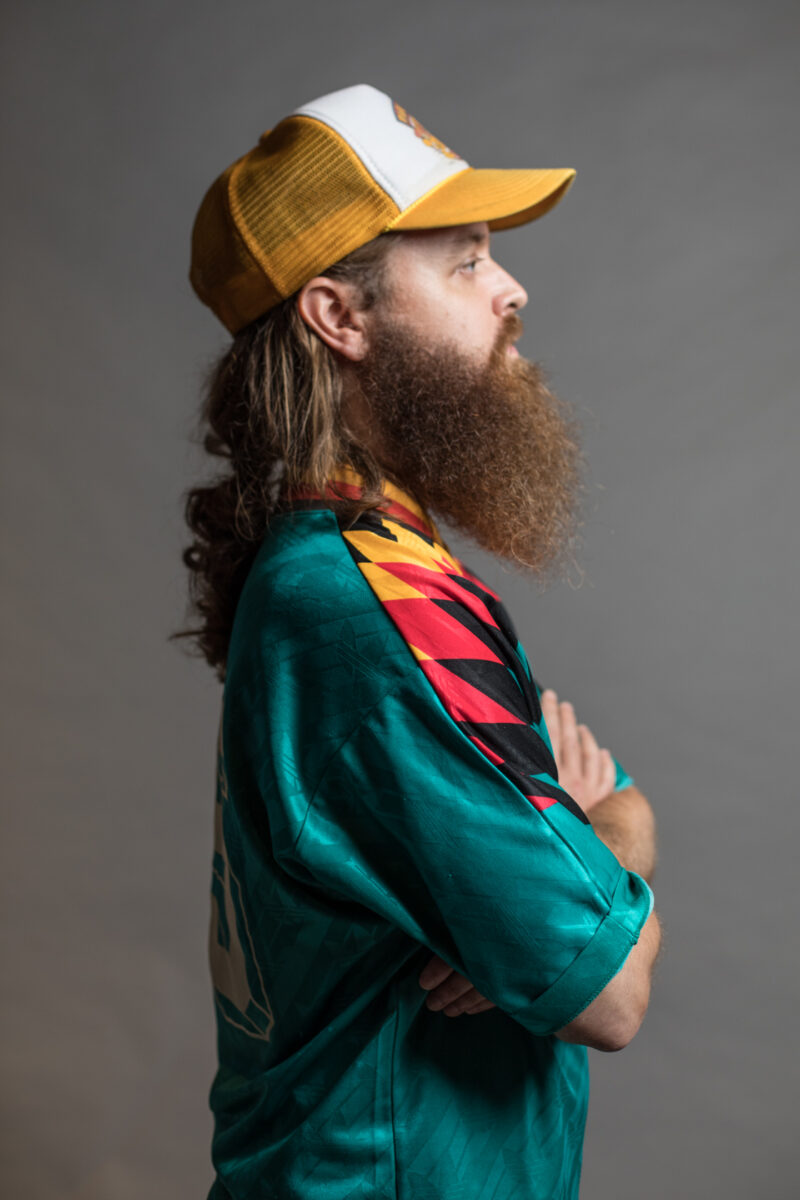
Killiam Shakespeare | photo by Josh Pelta-Heller for WXPN
TK: Corey, how did you first get into music? Did you play your whole life, or was it just something like later High School?
CB: I was playing piano pretty much my whole life. Like, studying classical piano.
TK: So you’re actually formally trained?
CB: Yeah, I was studying like Bach, Debussy, Chopin, all those guys. And then I guess, you know you get older and you start to want to expand your musical vocabulary to what you’re into. I ended up starting to play a lot of jazz and gospel music around Boston, played in a bunch of churches, played in this jazz club called Wally’s Jazz Café.
TK: I love that place. It’s right across from Berklee [College of Music], right?
CB: Yeah, that’s like kind of like, I was thinking how Steve was talking about the Lily, that’s sort of like Boston’s equivalent. You know, if you’re young and into music, you’re going to end up at Wally’s.
TK: But also not a lot of people kind of know about Wally’s too. It’s like a kind of hidden spot in Boston.
CB: Yeah, it’s small, it’s tiny. But musically it’s like, that’s just like the magnet of the whole city that people converge on. And yeah, I ended up just playing there for a few years, and then eventually made my way down to New York. And kept going further south.
TK: Do you think that classical has an influence on your composition today? Technical or stylistically, or both?
CB: Both. You know, composition was like, that was a really big thing. It still is a really big thing, but like all those composers were experimenting and trying to push the boundaries and push, you know, the science of music, or whatever you want to call it, further. And that’s what we’re trying to do. So even though not we might not necessarily play a classical song, we’re still trying to follow those same concepts of creating new harmonies that people have not heard before and creating new ways of interacting with each other, sonic textures and rhythms and stuff. I mean, you know, they were they were doing all that stuff like crazy. I think it’s more of the way that music is portrayed these days, as to why it’s not really as popular in the mainstream.
TK: Why is that?
CB: Well people look at it as just like old music from centuries ago, but it’s really like, it’s really some crazy stuff and you know. I think a lot of people if they were just exposed to it beyond a surface level of like, “Für Elise,” which is a great song. But there’s a whole bunch of classical music and music that these composers made.
TK: Would you recommend like a like a composer or a place to start there for people that just don’t know? That might be interesting and fairly accessible, you know?
CB: I would say check out Chopin and Debussy, a lot of French impressionists, because their sound is what you hear in a lot of modern movie scores.
SM: And also in our music. [laughs]
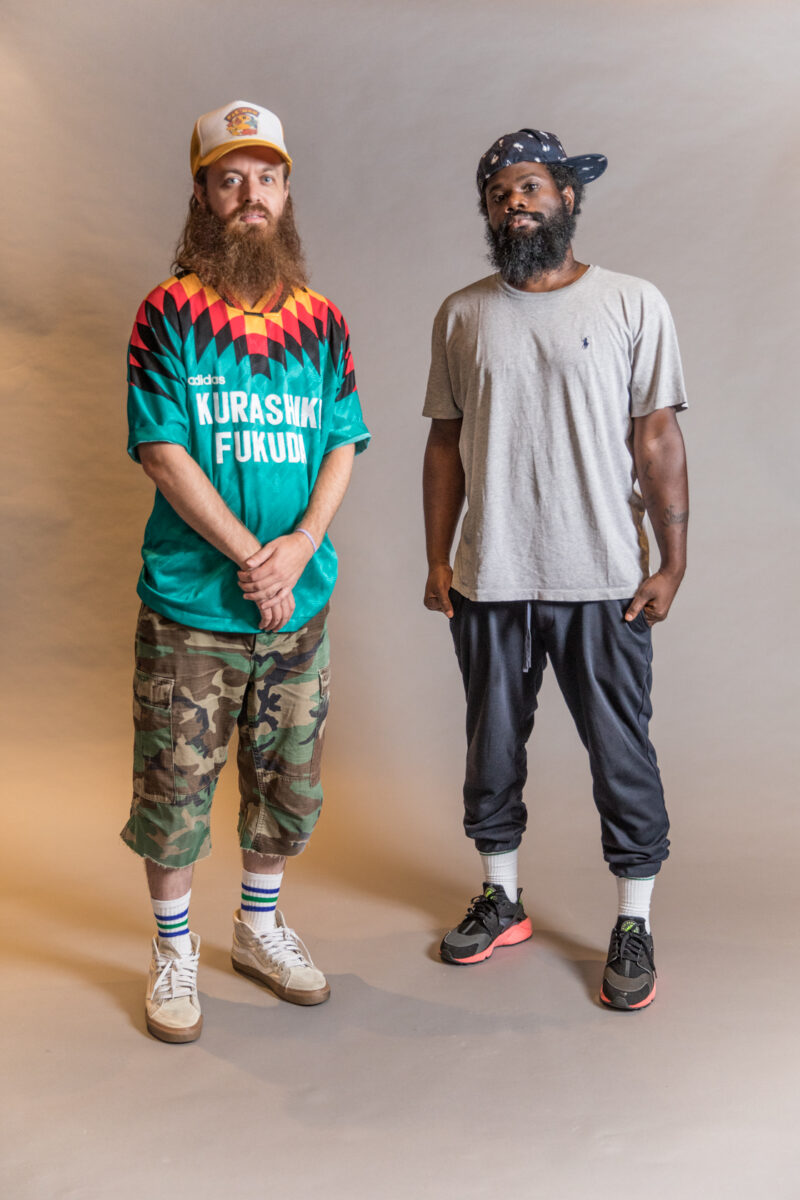
Killiam Shakespeare | photo by Josh Pelta-Heller for WXPN
TK: Do you guys have a favorite venue in Philly?
SM: I mean, by default, I guess Johnny Brenda’s. It’s a really cool place. We’ve been comfortable there, we’ve been able to have the right sound that supports the kind of music we like to play. So I would say Johnny Brenda’s is right up there.
CB: Especially when we were starting, we were playing at Silk City every month. That was a lot of fun because people just come out and have a good time. Get some good food.
SM: Yeah, Silk was basically our living room. We’d kind of like rehearse, pretty much, a lot of stuff. But it was fun we just got to play our music. It felt like there was no limits to the stuff that we can do. It just felt like it was a cool place to play our music and have a good time.
TK: In terms of art scene in Philadelphia, what do you think is an advantage in terms of having been here — for five years for you, Corey, and having spent your life here for you Steve — in terms of the city informing your creative process?
SM: For me I think is just being able to be around all these musical icons that are here. One in particular is DJ Jazzy Jeff. He’s been really cool for us, and just having someone like that to you know, bounce your music off of. He is so generous in sharing his platform and helping us become better artists. We record our music at his studio and he’s been a really cool person to be around.
And that’s just Philadelphia. Philly has so many different pioneers and artists here — like I spoke about James Poyser. Like, that’s really crucial for me, [in terms of] coming up and just learning things and doing things the right way, you know for our career now. So that’s been really cool. And Philly’s one of the top musical cities where it just offers all those kind of people. Jill Scott, you can go down the list of names like that, and to be around those people closely and work with them, that’s been really huge for myself and our group.
CB: The people, the talent. Being able to be around somebody like Jeff is amazing, and then just there’s so much talent and there’s so many creative people who are going for it. That’s just a really great feeling when you know, you’re trying to be creative and you’re going for it, and then there’s a community of people just like that, that are pushing and trying to make music or art or whatever it is that they’re doing, that are serious about it, and they’re really going for it.
TK: You feel the competition’s a benefit, not necessarily a cutthroat kind of thing?
CB: Well there’s a saying that iron sharpens iron, which is definitely true in a lot of ways. But even not so much as competition as just people with people that value creativity and originality, which there seems to be a lot of in Philly. So kind of a creative energy.
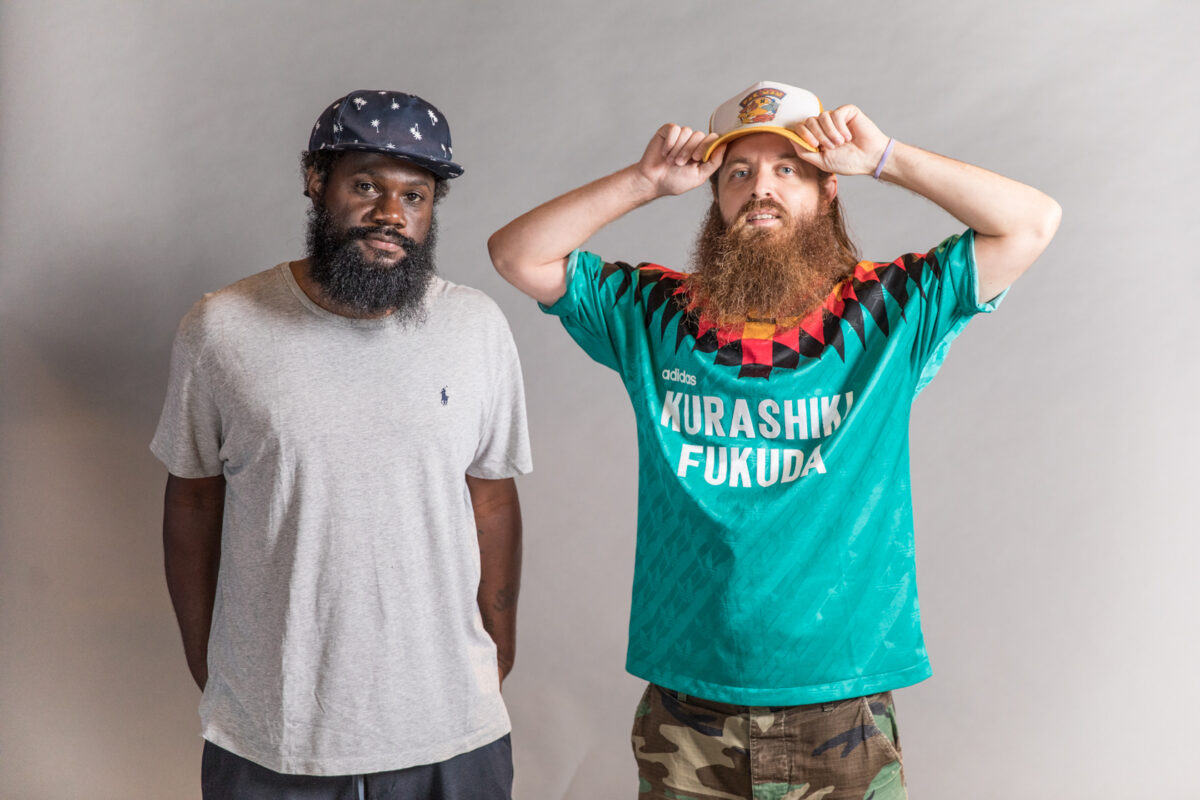
Killiam Shakespeare | photo by Josh Pelta-Heller for WXPN
TK: What about frustrations? You guys have any specific frustrations to Philly?
SM: I feel like the infrastructure, it could be a lot stronger than what it is. You know for us, we had a sort of kind of easy way with our music and getting to the next level and getting people aware of our music, but for a lot of other talented artists that are here, there’s not a lot of platforms for them to build on. You don’t even get to hear about a lot of these artists because the infrastructure is not strong enough to have you go and listen to somebody at a venue and it’s just…it could be a lot stronger, it could be a lot more catered to discovering the talent that’s here. Like I said, we have a lot of amazing talented people here. Every year someone is flashing out of Philly. But there’s more. There’s more Tierra Whacks. There’s more Questloves and more James Poysers, there’s so many different artists. It’s just ridiculous how talented it is. But the platforms aren’t geared to, you know, helping them get to that next level or even be heard and to begin with.
TK: What needs to change to make it more supportive? Do you think more people need to go into PR, or more need to open labels, or what is it? Because I’ve heard that complaint a couple times.
SM: Yeah, I mean more of everything, you know? More PR, more people just wanting to…for me, I feel like Philly is concentrated to the point where you have different camps and, you know, people really stick to their crews, and nobody’s really trying to open up and share their love.
You know, you think of groups like The Wu-Tang Clan. How many people were in that group? They were just like, year after year, you know, we’re putting Raekwon out…a lot of people blossomed from that crew. And, you know, you can’t really say that about Philly. Like, one artist blows up and that’s just their chance. I don’t know if they’re looking to come back and help other people. So I feel like what me and Corey do, when we’re working together and we’re trying to create platforms, we built the jam session called Beat Street jam. And it basically caters to, you can come to our event and you can discover somebody new, you could discover somebody that you heard before, or somebody that you never really, you know, took the time to listen to. And we’re playing their music and it sounds great, and you get to walk away and say I never heard of an artist like Mickey Miller, she’s from Chicago or I never heard of an artist like Daniella Bauer. She’s from New York by way of Germany. You never heard of these artists, but they’re so amazing and we just wanted to create that kind of platform to promote different music different genres of music and you know just different talent that you don’t always get to hear. So, you know, we were talking about infrastructure, I feel like things like that need to be more highlighted, and it’s just not for whatever reason. I don’t know.
TK: Where is that jam session? How often you guys hold it?
SM: Well we started it at Silk City. We did it successfully for a year and then we started getting busy with Killiam from just playing there and building up our audience in Philly. And then we moved over to Johnny Brenda’s, so we do like once a year. We also did it in Los Angeles ,we did it at the Sayers Club in LA when we went out and play. And again, it’s just like, you know, it’s a really cool event where we’ll have a different DJ come in and rock with us and we try to find artists that you know are really cool and people never heard of. Or maybe you heard of these people, but it’s a chance to show our versatility as a band and playing different genres of music. Like we like to play, as you can hear on our records. There needs to be more of that, I feel like.
CB: I agree with Steve that there could definitely be some more infrastructure to really build a scene. But sometimes it feels to me like Philly — not even necessarily the music scene — but Philly has a little bit of a fear-of-the-unknown mindset. So for us, you know — as an instrumental band that’s playing kind of experimental cool-but-weird type stuff sometimes — you know, I you see people be like, oh so who’s the singer? Oh, so y’all just musicians?
TK: You’re talking fans? Venues?
CB: Consumers of music. I mean, sometimes venues too. Definitely, you know, the average person that listens to music they’re used to hearing a rapper or singer. But you know, it wasn’t always like that. In the 70s we had bands like Return to Forever and Mahavishnu and Herbie and the Headhunters. These were relatively mainstream bands that people would go and check out. You know, it’s probably everywhere — it’s probably not just Philly — but there could be a little bit of sort of like a Philly “I’m not familiar with that, so I’m not going to check it out.” Sometimes it feels like that but sometimes it’s the opposite so, you know.
TK: Has that pressured you guys? Have you ever felt any pressure to cater to that at all, to have a rapper because of that kind of feeling? Or have you just resisted that?
CB: I mean, we haven’t necessarily resisted it. I mean we love rap music. So a lot of times we’ll work with a rapper, you know will work with The Bul Bey. I think that just comes from what we like, from our musical taste.
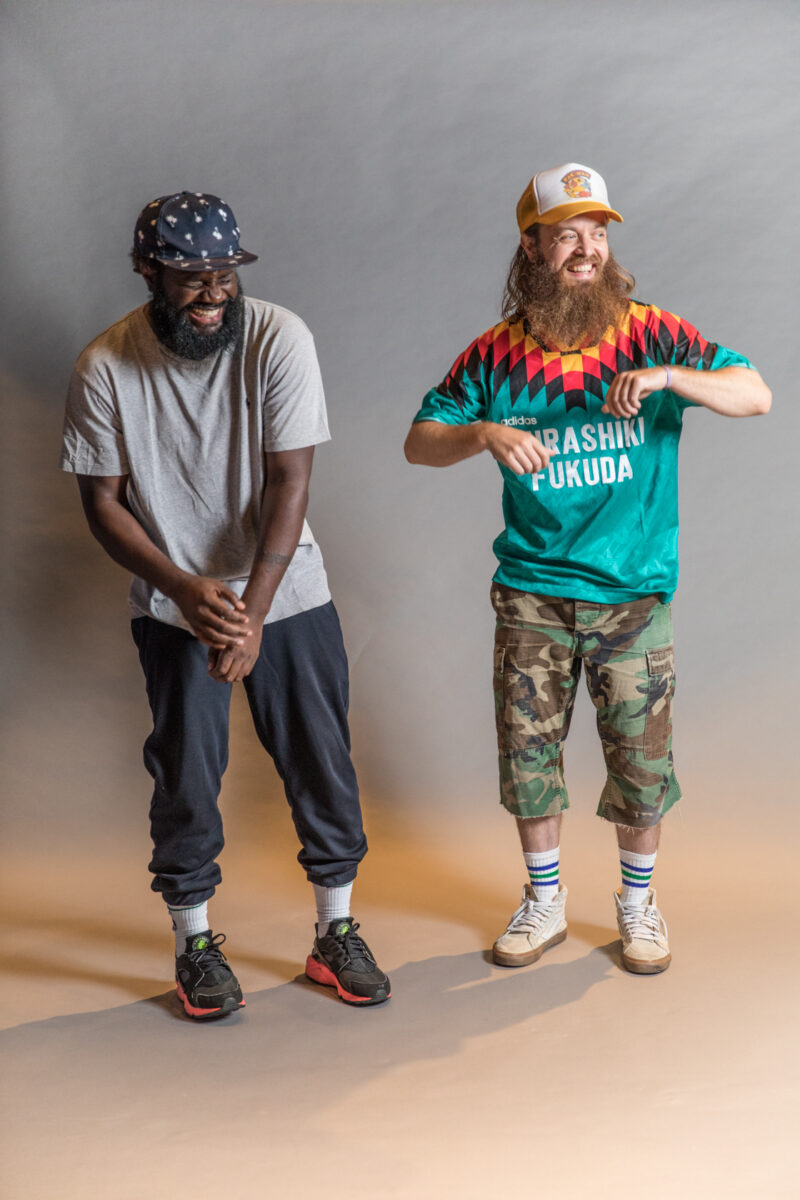
Killiam Shakespeare | photo by Josh Pelta-Heller for WXPN
TK: Favorite artists from Philly or most influential artists from Philly?
SM: I know a lot of people sleep on him, but I’m really cool with Dayne Jordan. Dayne is a MC that needs more credit and he’s talented. There’s nothing that he can’t do as a MC and I feel like that just he needs to be more highlighted.
CB: Obviously, James Poyser has a huge influence on us.
SM: And as far as a mentor, I started with Kelo Saunders — he’s an amazing engineer and producer that worked with The Roots a lot. I sat with Questlove a bunch, and also James Poyser, of course, and down the line I met Jazzy Jeff. Those guys were pretty instrumental, and just being able to see how they work in the people that they have around them, and it was easy. I’m blessed because a lot of people don’t really get that opportunity to be around these kind of pioneers. So those people were definitely instrumental and you know my career.
CB: Vidal Davis is somebody we work pretty closely with these days. And somebody like Vidal, it’s sort of like a blessing to be able to call him and have him in our corner and him even be in Philly, which a lot of people I think take for granted. I definitely take it for granted, just that somebody like Vidal’s around. He mixed our album, you know helps us record.
SM: So many hits under his belt which is just ridiculous. We can be are all day name and all the hit records he did and of course you guys know about them as well. But yeah, he’s pretty instrumental like understanding our music for what it is and not coming in as an engineer and just capping it like oh this is how we’re supposed to mix this music. He came in with the understanding that this is instrumental music that needs to be highlighted and it needs to be mixed the proper way so that when you listen to it, you will understand why we used all of these different instruments and just the way we put the record together. He came in he understood it and it was amazing.
You don’t really get that those kind of opportunities where somebody would come in and they feel passionate about mixing your music and getting it to the place where it needs to be. So that was really huge for Vidal, we need to give him a shoutout for that.
TK: You guys still live in the city?
SM: Yes, I’m in West Philly.
CB: I’m in Germantown.
TK: Yards or PBC?
CB: I’ll go with Yards.
SM: I don’t drink beer. [laughs] I usually give all the beer to Corey.
- Killiam Shakespeare | photo by Josh Pelta-Heller for WXPN
- Killiam Shakespeare | photo by Josh Pelta-Heller for WXPN
- Killiam Shakespeare | photo by Josh Pelta-Heller for WXPN
- Killiam Shakespeare | photo by Josh Pelta-Heller for WXPN
- Killiam Shakespeare | photo by Josh Pelta-Heller for WXPN
- Killiam Shakespeare | photo by Josh Pelta-Heller for WXPN
- Killiam Shakespeare | photo by Josh Pelta-Heller for WXPN
- Killiam Shakespeare | photo by Josh Pelta-Heller for WXPN
- Killiam Shakespeare | photo by Josh Pelta-Heller for WXPN
- Killiam Shakespeare | photo by Josh Pelta-Heller for WXPN
- Killiam Shakespeare | photo by Josh Pelta-Heller for WXPN
- Killiam Shakespeare | photo by Josh Pelta-Heller for WXPN
- Killiam Shakespeare | photo by Josh Pelta-Heller for WXPN
- Killiam Shakespeare | photo by Josh Pelta-Heller for WXPN
- Killiam Shakespeare | photo by Josh Pelta-Heller for WXPN
- Killiam Shakespeare | photo by Josh Pelta-Heller for WXPN
- Killiam Shakespeare | photo by Josh Pelta-Heller for WXPN
- Killiam Shakespeare | photo by Josh Pelta-Heller for WXPN
- Killiam Shakespeare | photo by Josh Pelta-Heller for WXPN
- Killiam Shakespeare | photo by Josh Pelta-Heller for WXPN
- Killiam Shakespeare | photo by Josh Pelta-Heller for WXPN
- Killiam Shakespeare | photo by Josh Pelta-Heller for WXPN
- Killiam Shakespeare | photo by Josh Pelta-Heller for WXPN
- Killiam Shakespeare | photo by Josh Pelta-Heller for WXPN
- Killiam Shakespeare | photo by Josh Pelta-Heller for WXPN
- Killiam Shakespeare | photo by Josh Pelta-Heller for WXPN
- Killiam Shakespeare | photo by Josh Pelta-Heller for WXPN
- Killiam Shakespeare | photo by Josh Pelta-Heller for WXPN
- Killiam Shakespeare | photo by Josh Pelta-Heller for WXPN
- Killiam Shakespeare | photo by Josh Pelta-Heller for WXPN
- Killiam Shakespeare | photo by Josh Pelta-Heller for WXPN
- Killiam Shakespeare | photo by Josh Pelta-Heller for WXPN
- Killiam Shakespeare | photo by Josh Pelta-Heller for WXPN
- Killiam Shakespeare | photo by Josh Pelta-Heller for WXPN
- Killiam Shakespeare | photo by Josh Pelta-Heller for WXPN

